Hey, look. I'd like to talk about Twin Peaks for a little bit. And gender. Season 3, specifically. And my personal experience. Whether you've seen it or not. I don't have a grand plan. I'm not sure what my voice is anymore. I don't have a specific conclusion or structure yet. Somebody might yell at me. Worse, maybe no one will care.
These are all reasons I've stopped myself from writing in the last few years.
According to my New Rules, none of these apply anymore! YAYYYY! (also, wow, I just re-read my new rules and they're really good. I should listen to myself more often!!!)
SO here's my disclaimer:
THE FOLLOWING THOUGHTS ARE JUST FOR FUN!
It's all made up and probably wrong! If something is incorrect or incomplete, that's okay! I didn't mean for it to be otherwise. I'm gonna speculate about What It All Means and it's gonna be strictly about what happens in my head. I don't care what David Lynch or Mark Frost or anybody else "meant" when they made this. I'm not doing "lore analysis!" We are purely in the realm of fanfiction, fantasy, and an exploration of my interior above all else. If you disagree with me on any point: FANTASTIC! wonderful! be at peace
What we're gonna do:
I'm gonna start watching Twin Peaks: The Return, Episode 1, and anytime I feel like taking a screamshot, I will! And then I'll write something that comes to mind. None of this is going to be in order. I'll refer to other things if I need to (I read literally 9 books about Twin Peaks & David Lynch's work last summer, watched or re-watched all of his movies, and have watched & listened to so many other people's responses). I'm gonna spoil the heck out of everything immediately! And none of what I write is gonna be in any particular order, otherwise I'll think too hard and stop! This isn't a book; I'm just posting! Not academic, not formal, not well-ordered, just notes and observations :)
Oh, and I'll refer to seasons 1 and 2 sometimes, but I'm focused on Season 3 as kind of its own thing (with a long strange history). And also, the incredible and terrifying and heartbreaking film Fire Walk With Me. I'm gonna be a little silly, and I'm gonna be a lot serious!
But I think it might be interesting even if, like most of my dearest friends, you haven't watched any of it! You can let me know if it is. I'd like you to relax your assumptions about what this thing is, because I think it's one of the most interesting televisual things ever made! Please respect my interest!!!!
All right, so I got a greek salad, some hummus, and some kinda juice I forget which kind. Pull up a snack, and let's fucken goooooooooo
CONTENT WARNINGS FOR DISCUSSIONS OF
violence against women, sexual violence, violence in general, trans issues, dysphoria, body horror, systematic oppression, existential dread, suicide, drugs, depression... a whole bunch of rough stuff!
BASIC ASSERTIONS
I re-watched The Return about a year ago, after I had formally recognized that I'm A Trans but hadn't really talked about it with many people yet. When I reached the point where Laura Palmer (who "died" as a senior in high school but is still present in various ways) says, "I'm dead... and yet I live!" I actually started crying. Because for various reasons, known and unknown to me, I've described myself as a ghost since my senior year of high school. A lotta shit went wrong for me that year, but most of it was, in retrospect, tied PRETTY STRONGLY to my increasingly-fraught relationship with ME OL' GENDER that it would take me another decade and a half to work through because our culture sucks shit, and because bad people maintain power by denying us self-knowledge.
Anyway I've said many times, with depressive clarity, that I feel like a ghost. Like my life lost meaning and coherence circa puberty, then BIG TIME during the last year of high school, and that I've been ever more depressed, dissociative, self-loathing, and distraught with each passing year. Good things have happened, wonderful people have loved me, and I've had plenty of happy times. But there's a deep substrate and painful gravity of loss, longing, and misalignment running under everything I've done for over 20 years. Longer if you count — which I do!!! — being bullied out of my personality, by my family and community, from as young as I can remember for being Not Masculine Enough and Absolutely Neurodivergent. Go fuck yourselves, small-minded bigots!
Or as David Lynch's character says in The Return, to David Duchovny's trans character, "And when you became Denise, I told all of your colleagues, those clown comics, to fix their hearts or die!"
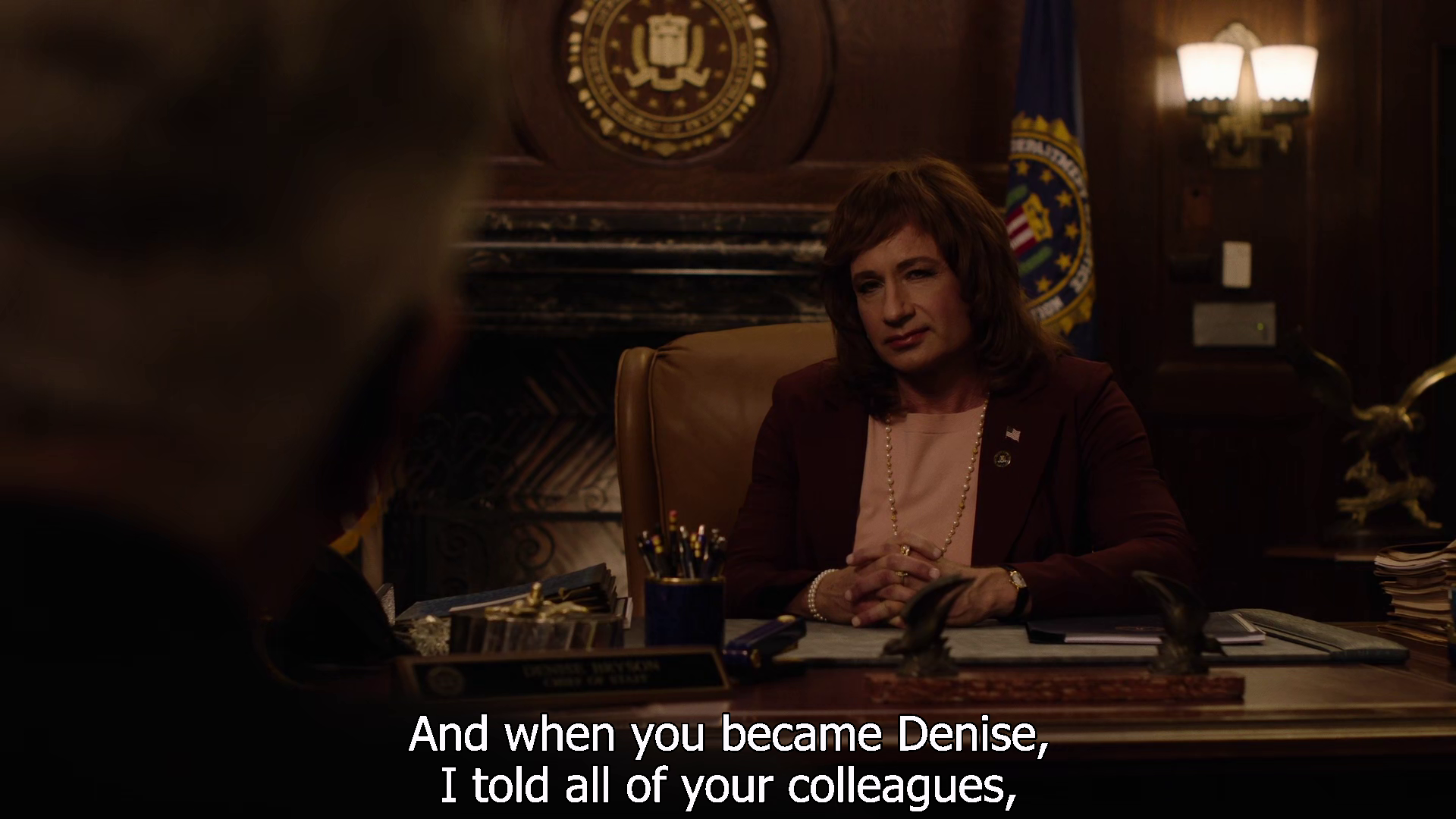
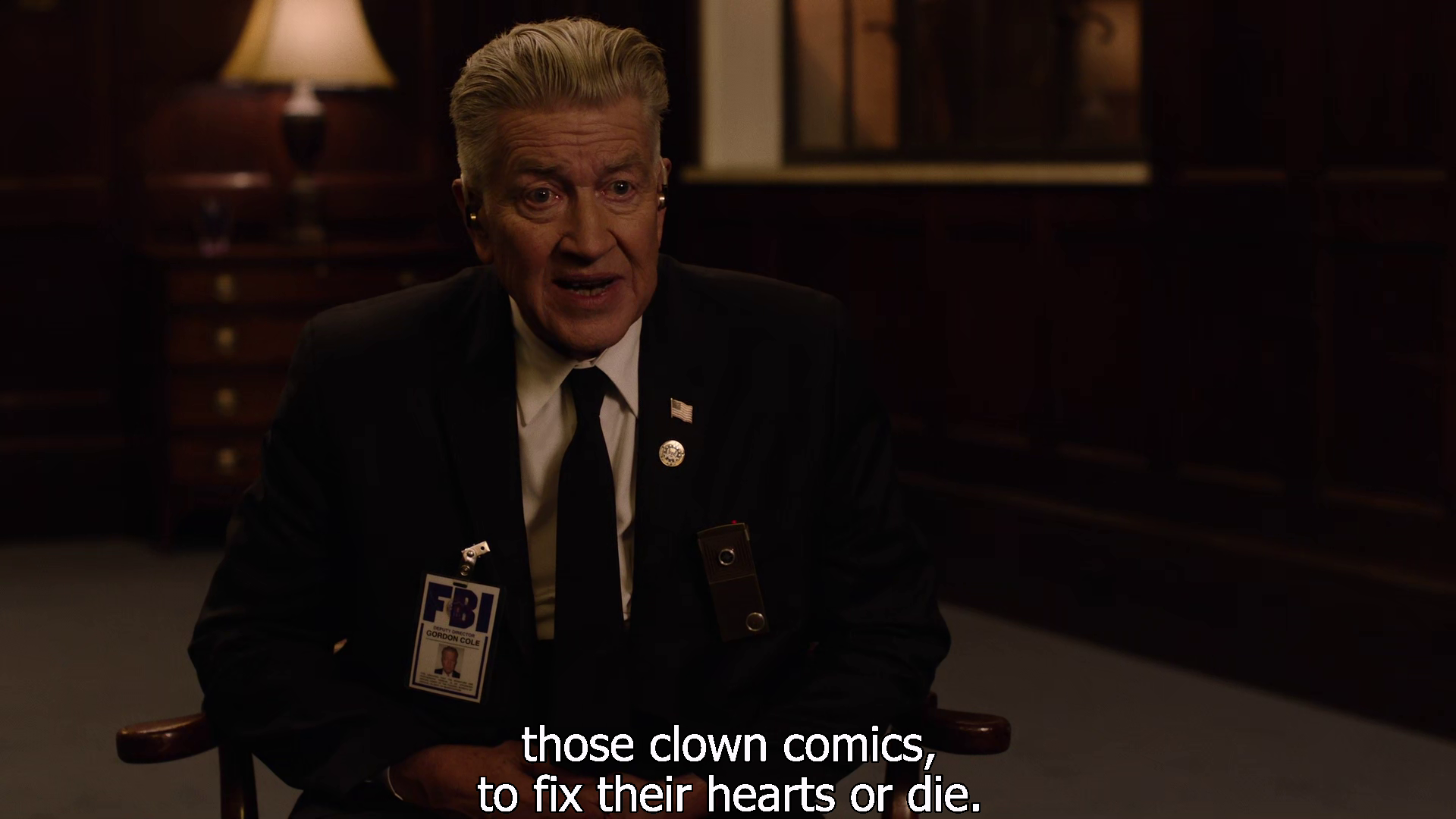
FIX YOUR HEARTS OR DIE
So, when Laura Palmer says she died, and yet she lives, I pointed at the screen like Leo #2 in the plane movie. (The turtle is Leo number one.) And for the rest of the watch, I was Thinking About Gender. And wow, uh, you sure can read Twin Peaks as a series of stories taking place in a subconscious or dreaming mind, trying to surface the truth of being a trans girl while it is repeatedly shut down and repressed by trauma and forced masculinity!
And then I read Lou Ming's essays about Finding Laura via dreams, watched some of David's other work through the same lens, and my brain went all kinda places. I'm not gonna be prescriptive or diagnostic about another person. But for me, there is a tremendous amount of illustrative gender dysphoria and discomfort throughout David Lynch's work, including the shattered bliss of impossible lesbian desire in Mulholland Drive, the view-from-the-closet fascination in Blue Velvet, the absolute and terrifying prison of masculinity in Lost Highway, the deep outsider dissociation and mechanized discomfort of occupying the man's role in Eraserhead, the somber acceptance of being physically wrong and never understanding why in The Elephant Man, the emotional paralysis and stunted possibility of being a man in need of connection in The Straight Story, all the way to a kind of ecstatic release into actualized feminine chaos in Inland Empire.
And then there's The Return, which is a summary and mutation of everything that came before it.
Again, I'm not saying this is what Twin Peaks "IS ABOUT," nor am I saying anybody involved "is trans" or has any knowledge of that perspective. There are, unfortunately, a lot of ways and reasons to become fucked up about gender and interpersonal relationships here in the curse of humanity. But I'm saying that it has been helpful and fascinating to me to read it this way, annnnnnd that there are A LOT of ways this reading works:
THESIS STATEMENT
Laura Palmer is a trans girl who 'died' by going deep into denial as she crossed into adulthood, and that Twin Peaks in its entirety is Laura's internal landscape trying to solve the mystery of how "she" died, the trauma and avoidance in a repeating cycle of preserving the empty "self," and why everything has gone so painfully and terribly wrong without access to that truth.
Because that's what happened to me.
THIS HAS HAPPENED BEFORE
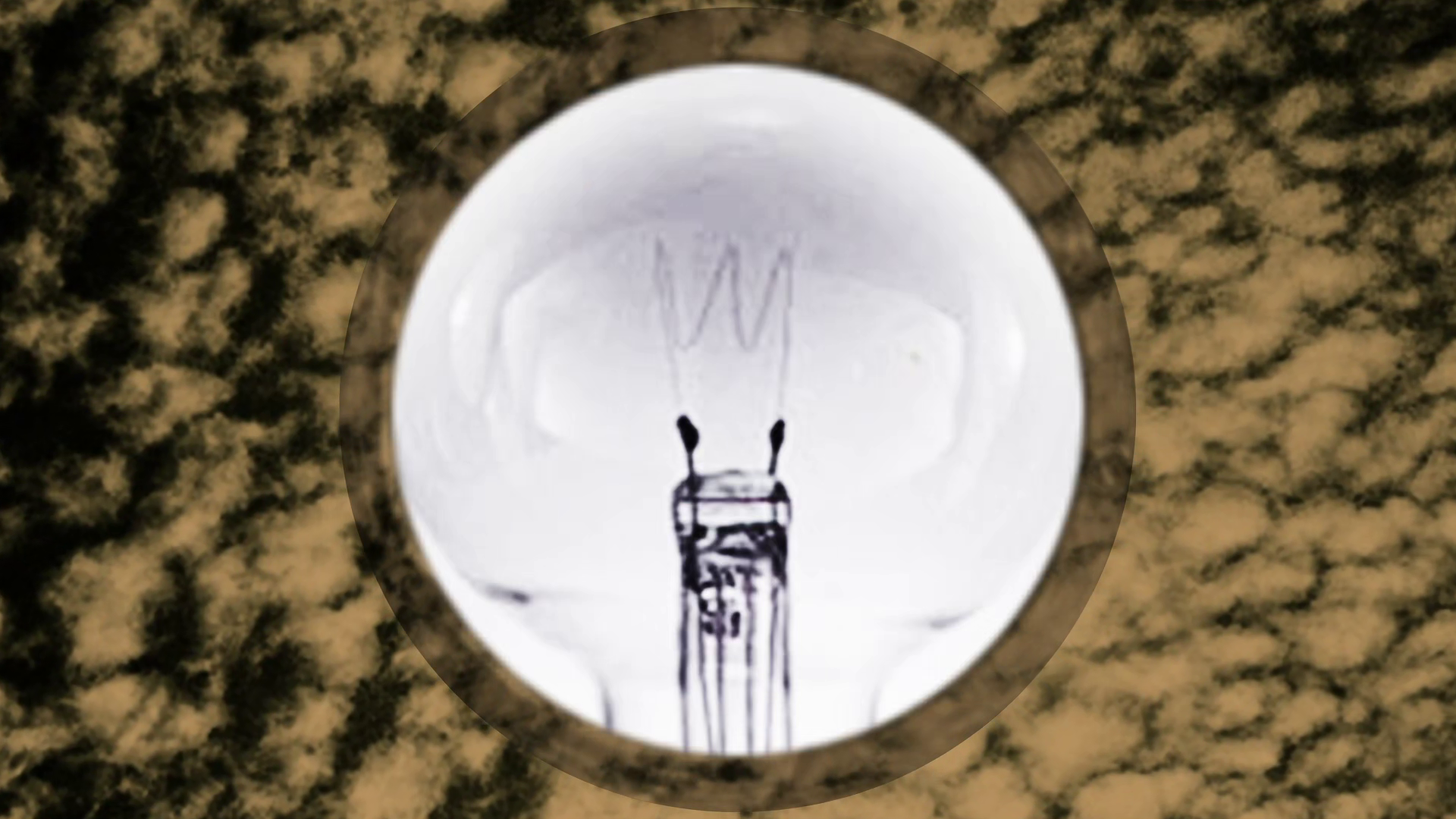
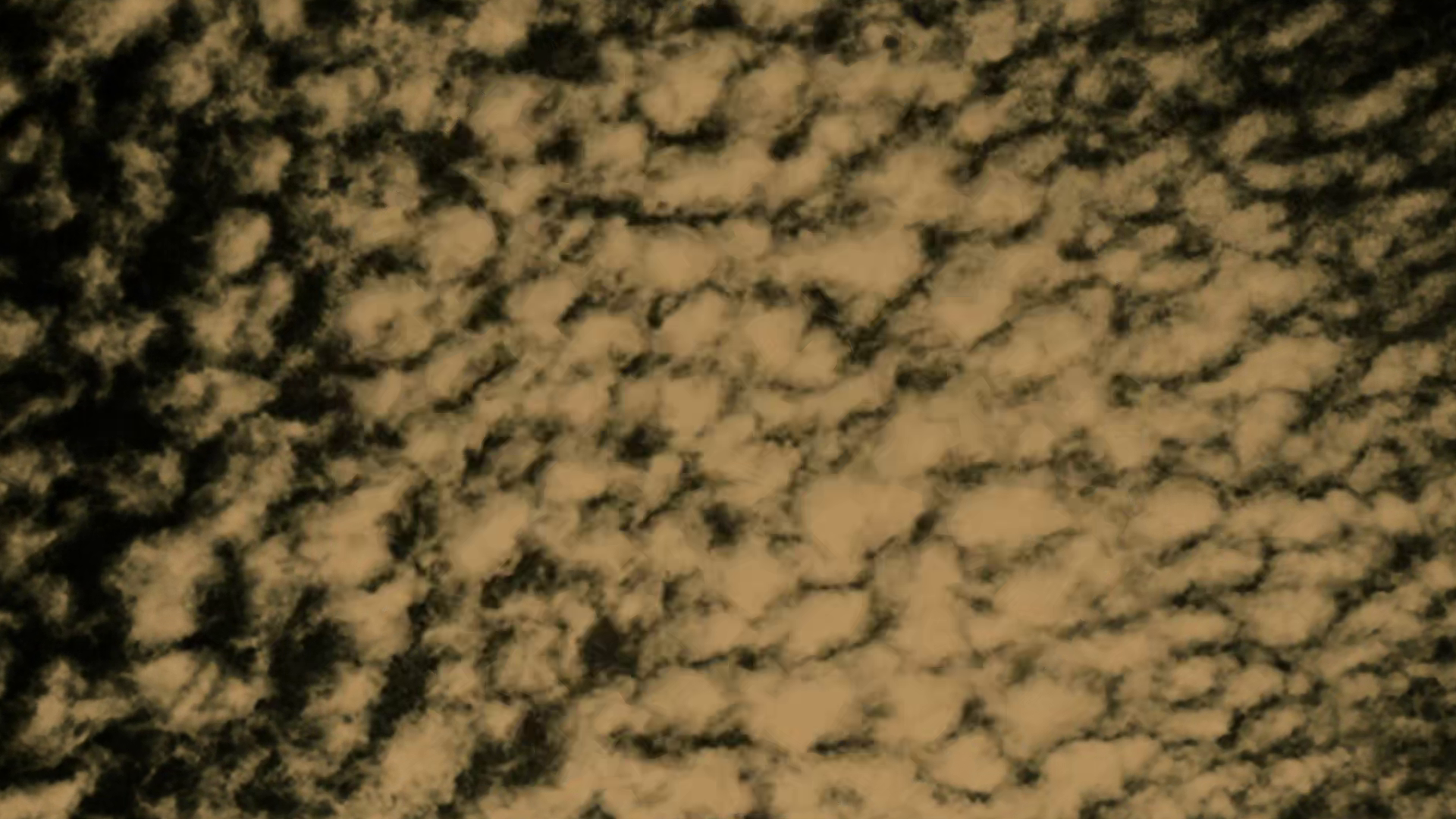
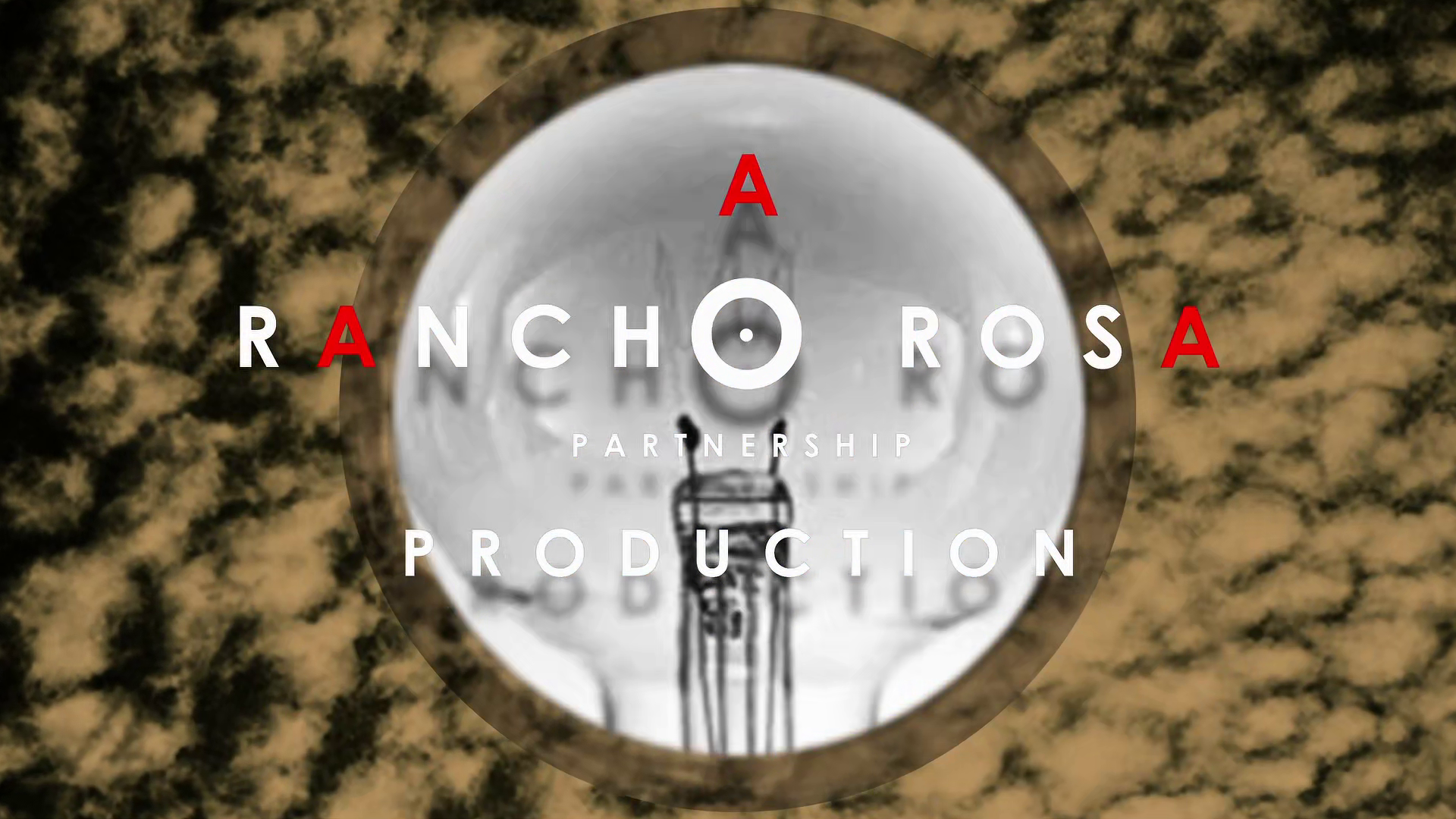
electricity, orb, atom bomb, clouds, good text I like it
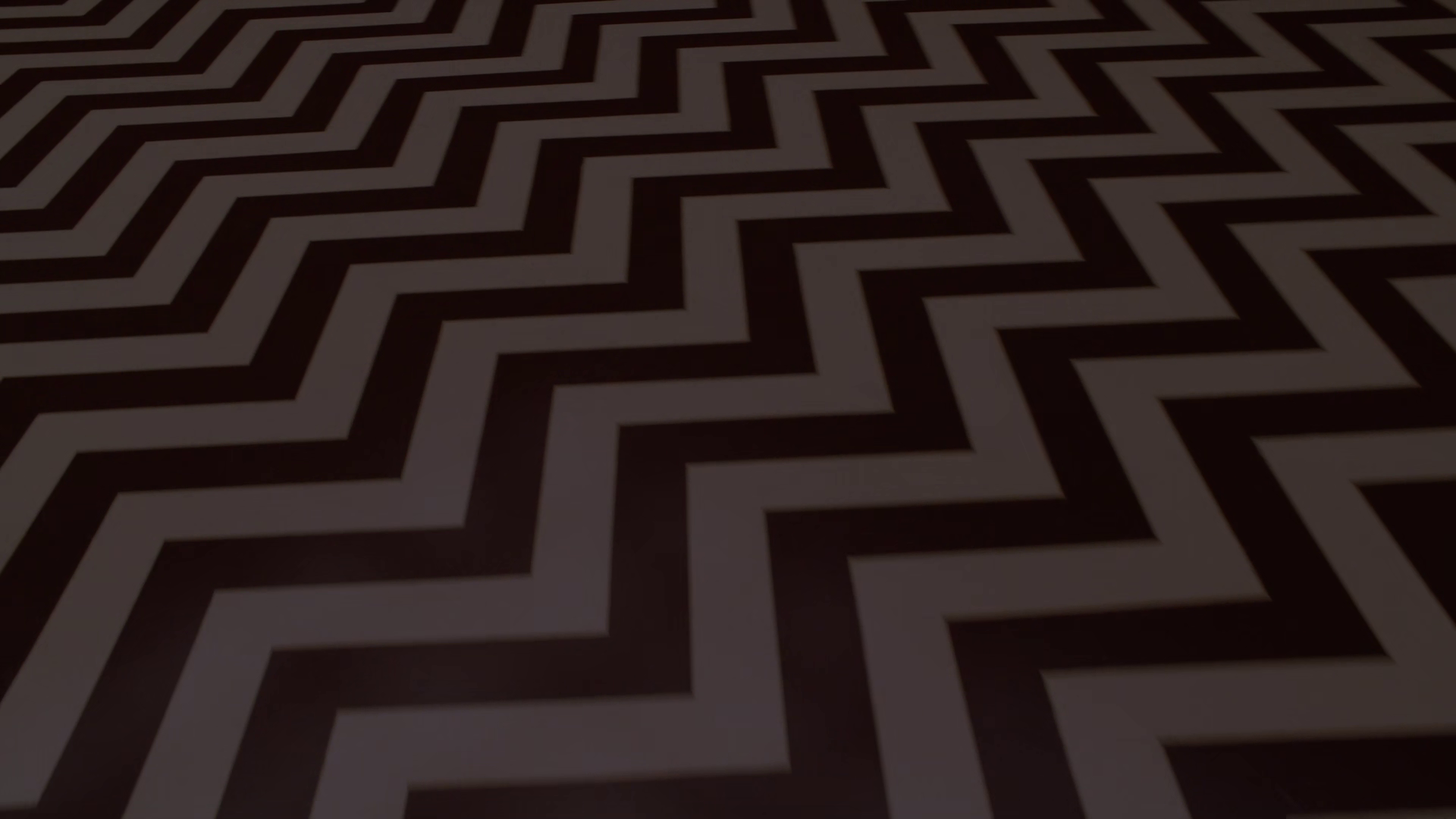
All right so I'm gonna make some assertions. This one is based on a premise from this extremely good set of essays, Find Laura, by someone called Lou Ming, who unfortunately appears to have died last year. My writing this is absolutely inspired by his writing, including the format of just watching the show and talking about it in order. I'm going to approach it from a different angle than he did, but there's a lot he observes in there that I found VERY INTERESTING and will be building on here!
One of the questions he asks is: "What if everything anyone says in Twin Peaks is literally true?" DL's work is renowned for being weird and zany and impossible to truly understand. Some people think that's fun, other people think it's bullshit! I've been through every stage. BUUUUUUT as soon as Lou asked that, I felt the tumblers in my headlock spin around rapidly and snap into place. So let's keep that in mind. We might not know what a given statement means, but let's assume that somehow it's true, not just some wacky thing David made up to be mystifying for its own sake!
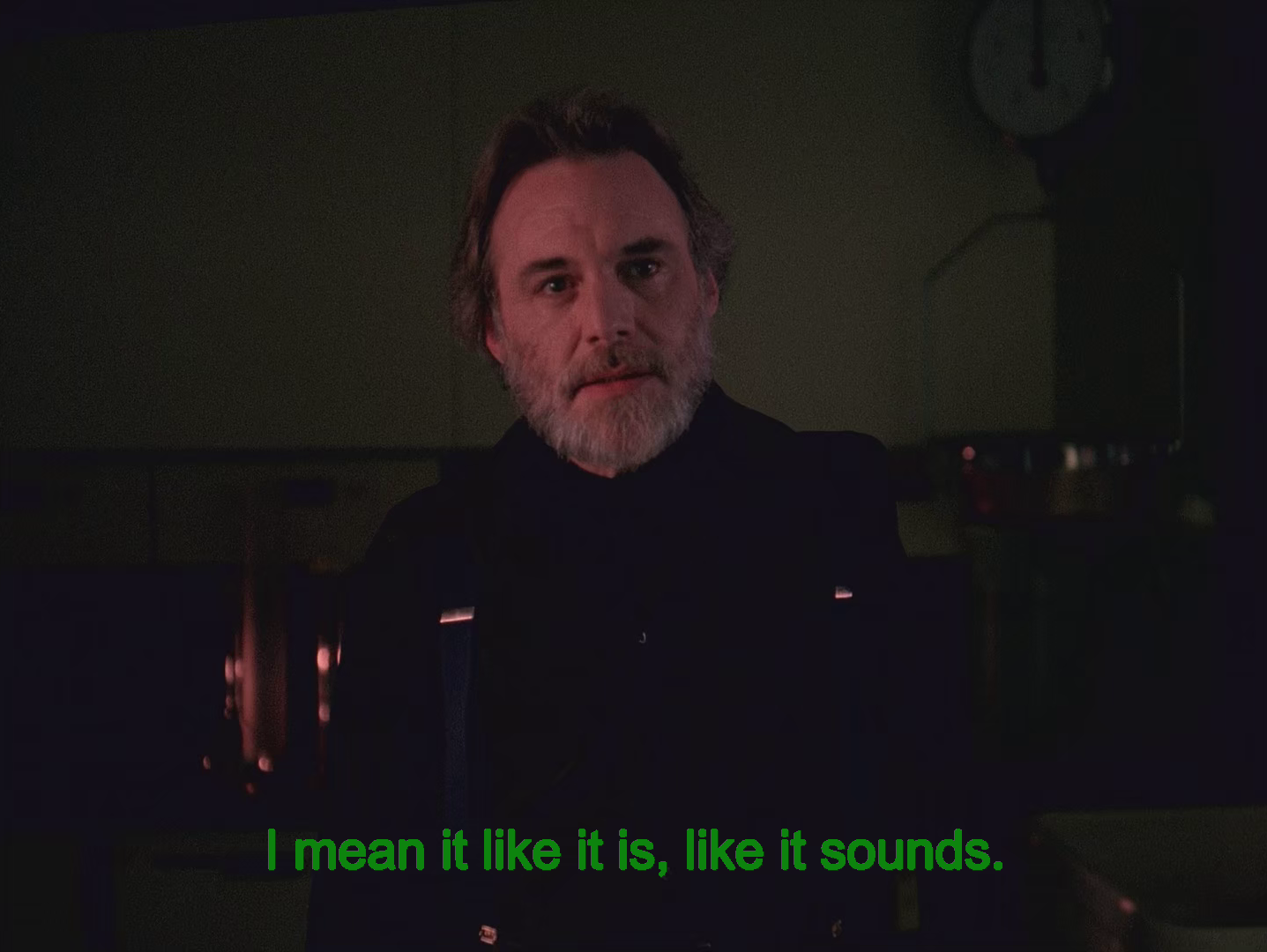
So after the Rancho Rosa production card, the first thing we see is flying wildly over this zigzag floor. We, the viewer, are here to begin with.
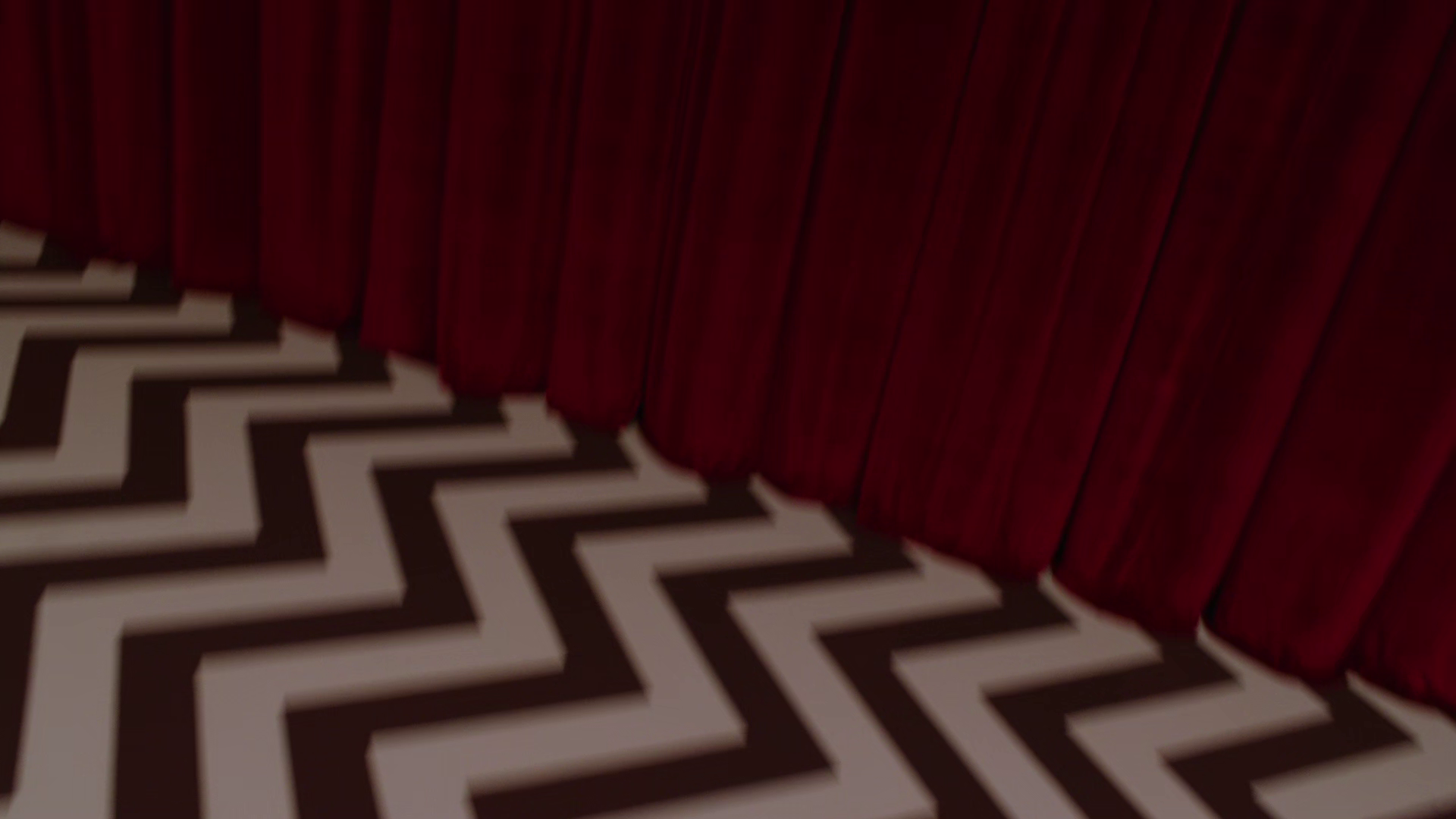
Zigzag becomes red curtain.
The other thing Lou Ming asserts is: the hidden narrative of Twin Peaks is that everything we're seeing is part of Laura Palmer's subconscious attempting to process a trauma she's hidden from so deeply that she can't face it.
All that we see on the screen represents Laura trying to remember while simultaneously repressing the memories of her trauma. When she can finally accept the truth [...], she can live as herself again. In other words, Laura Palmer is not literally, physically dead; she’s so traumatized that she can’t accept her reality.
BING BING BING hello, that is the transgender experience calling, as always, from inside the house!!!
(I'm deliberately omitting the part where Laura Palmer is sexually violated by her father. Not because it's not important, but because I think the depictions of violence against women in this series are really important, right at the heart of this thing. I want to be really careful about how I discuss that; I'm not used to trying to talk about it! It's not what I want to focus on right this second, though I want you to know that I know!)
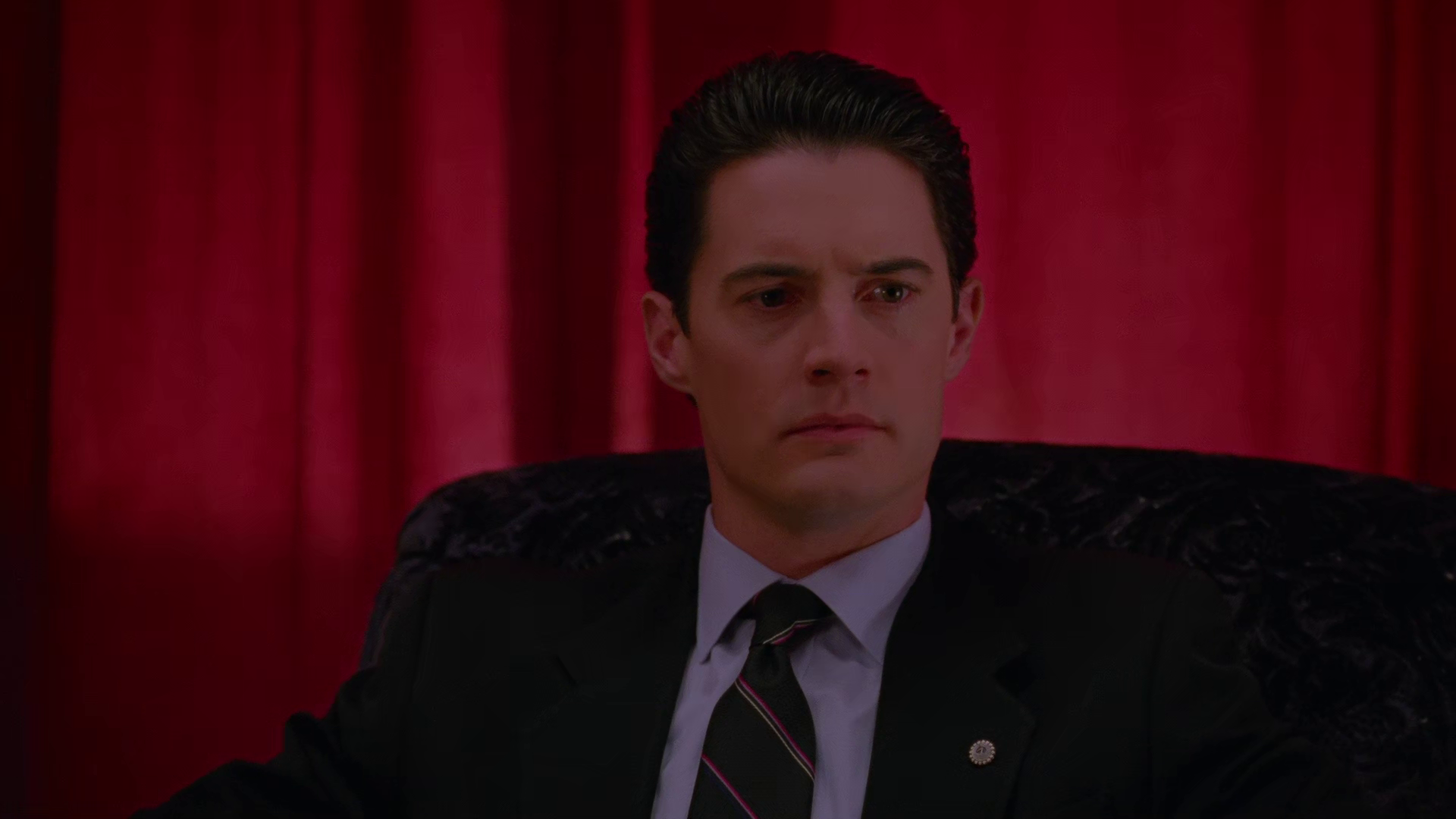
this guy is important lol, and not just because he's "the hero" of the original show. but we'll get to him
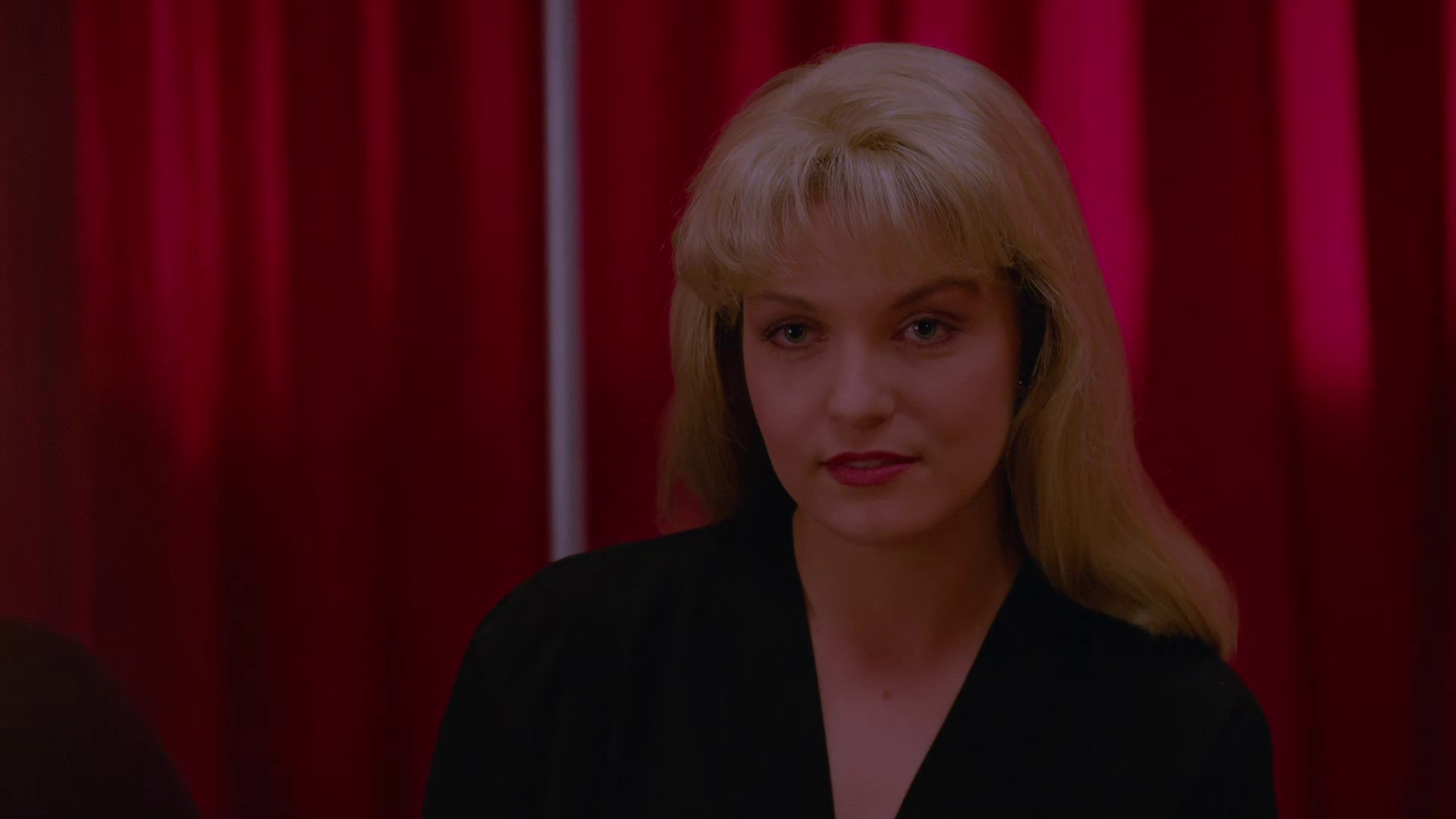
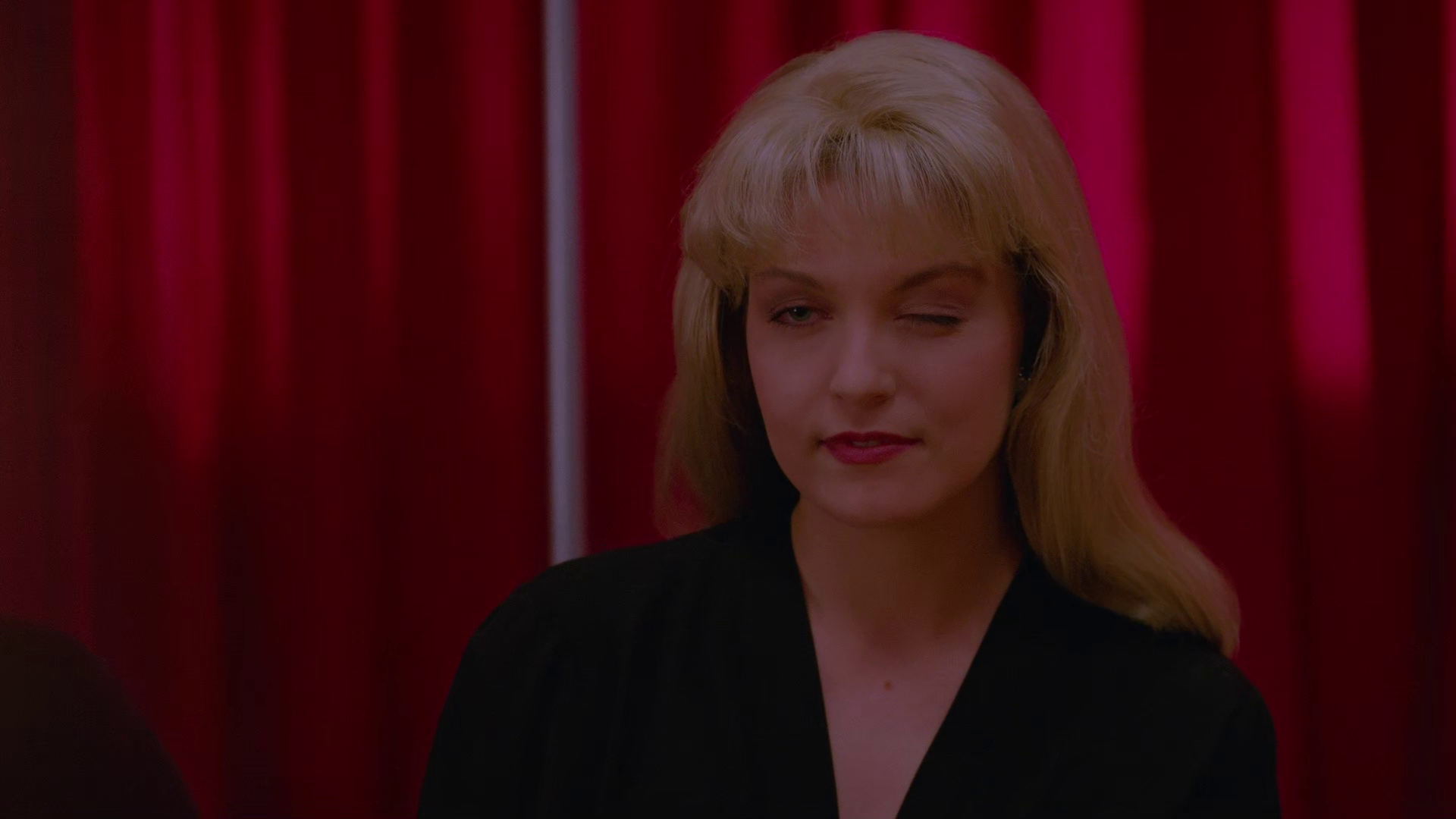
But he's not as important as her. This footage is from the end of TP season 2, back in 1991. One of the coolest things about Twin Peaks is that it started out neat, became a big mess, and David came back and made the last episode an extremely strange and resonant piece of television, including this assertion by the Dead Girl Who Lives, Laura Palmer, that she would see Agent Cooper (and us) 25 years later.
AND THEN THEY FUCKEN DID IT THAT'S SO COOL
(there wasn't really a master plan, but the fact that it worked out this way is just one of the neatest things)
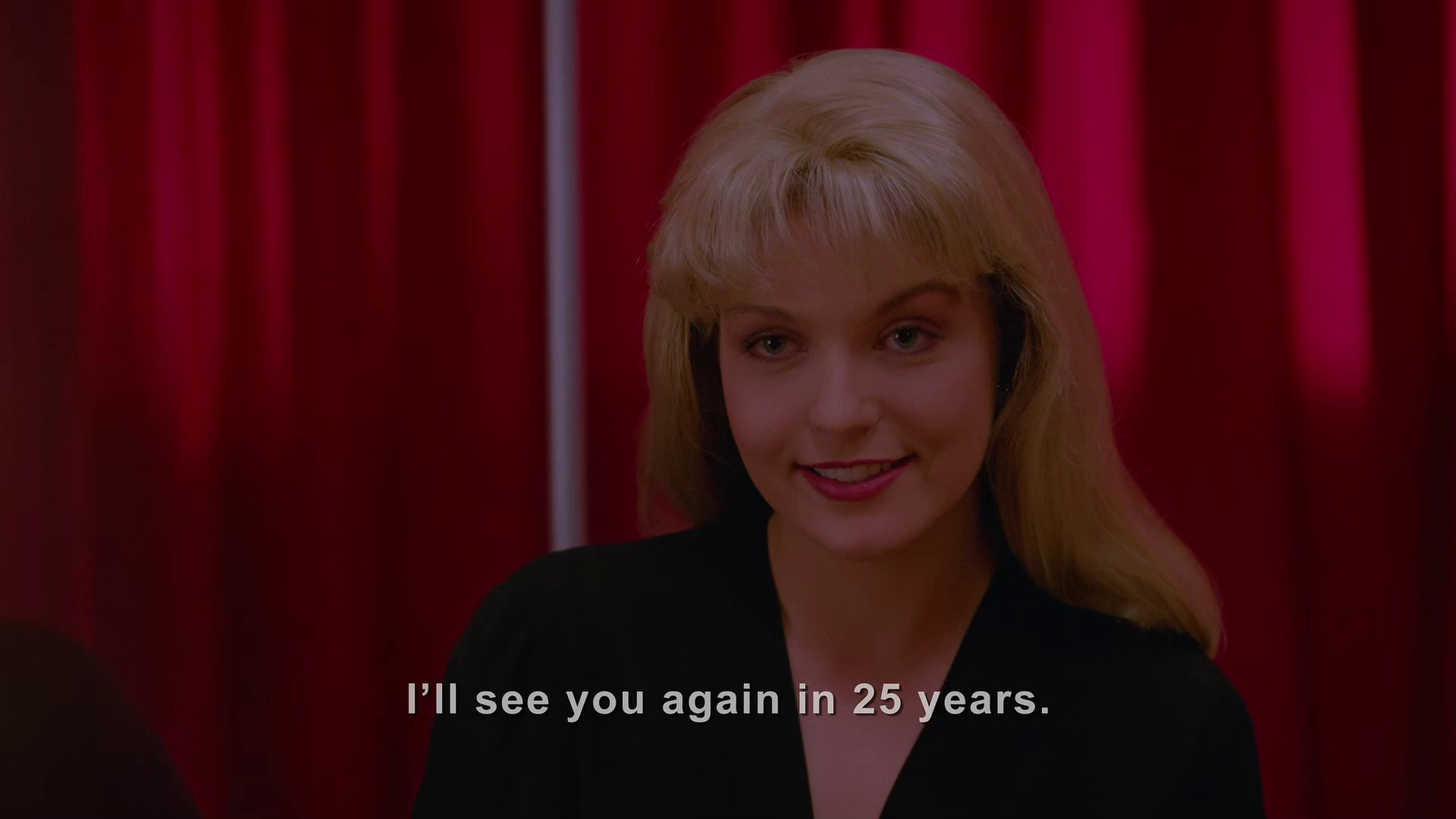
okay and then she says, "meanwhile," makes this well-known gesture, and then the film freezes. Fades to black. And comes back up on the cloudy air above Twin Peaks.
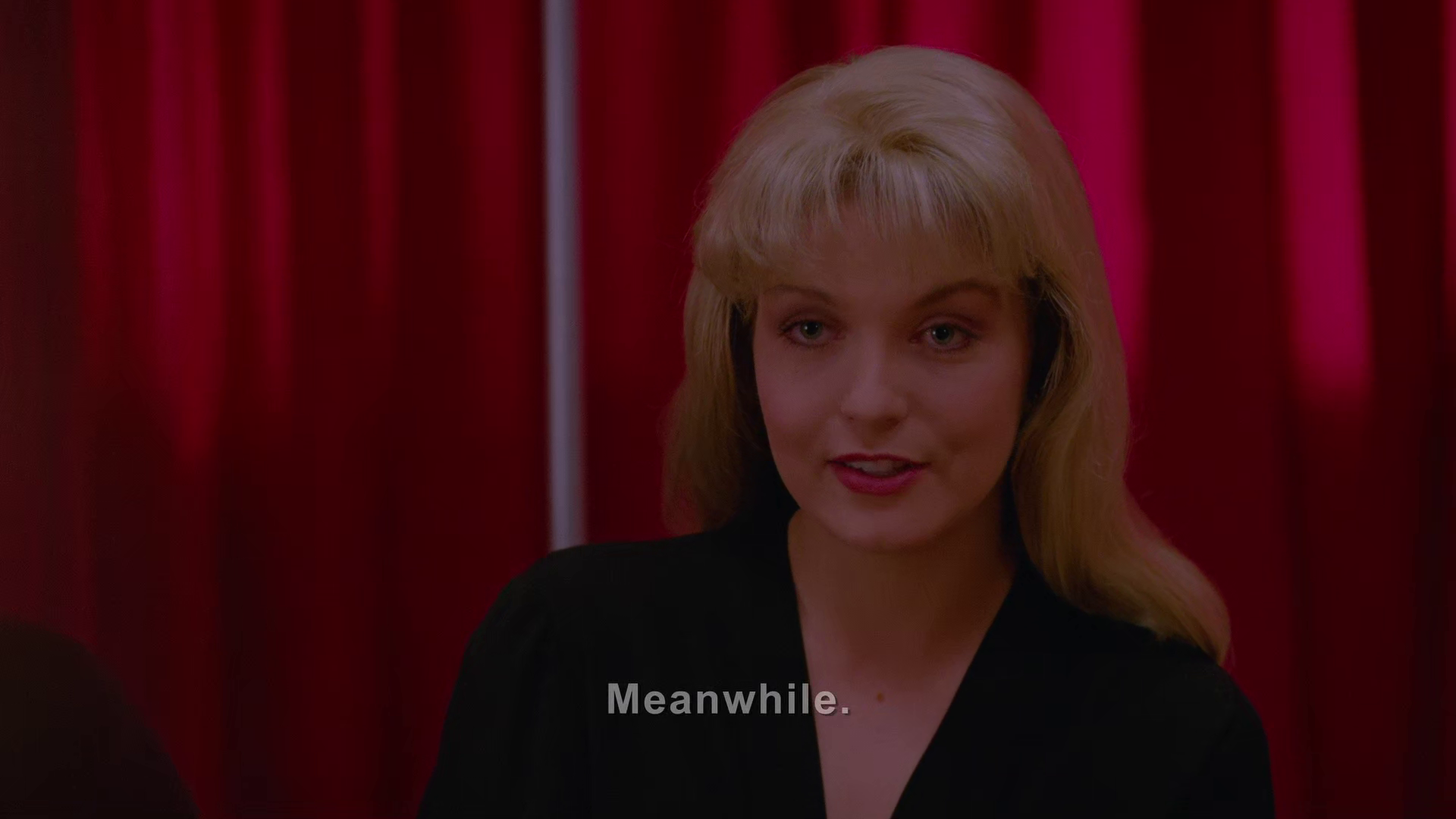
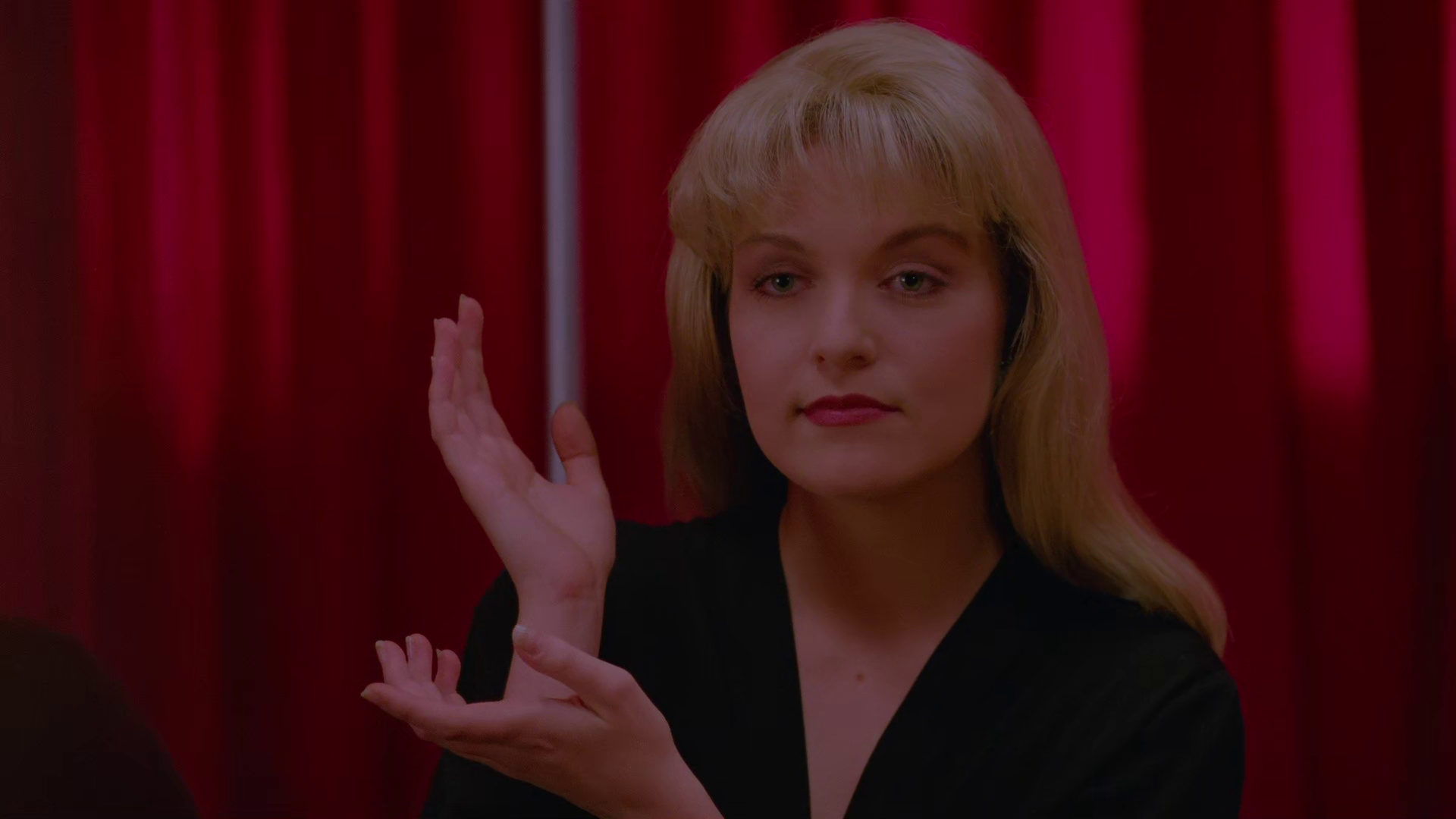
So if we take everything literally, we are now being shown things that happened in the meanwhile.
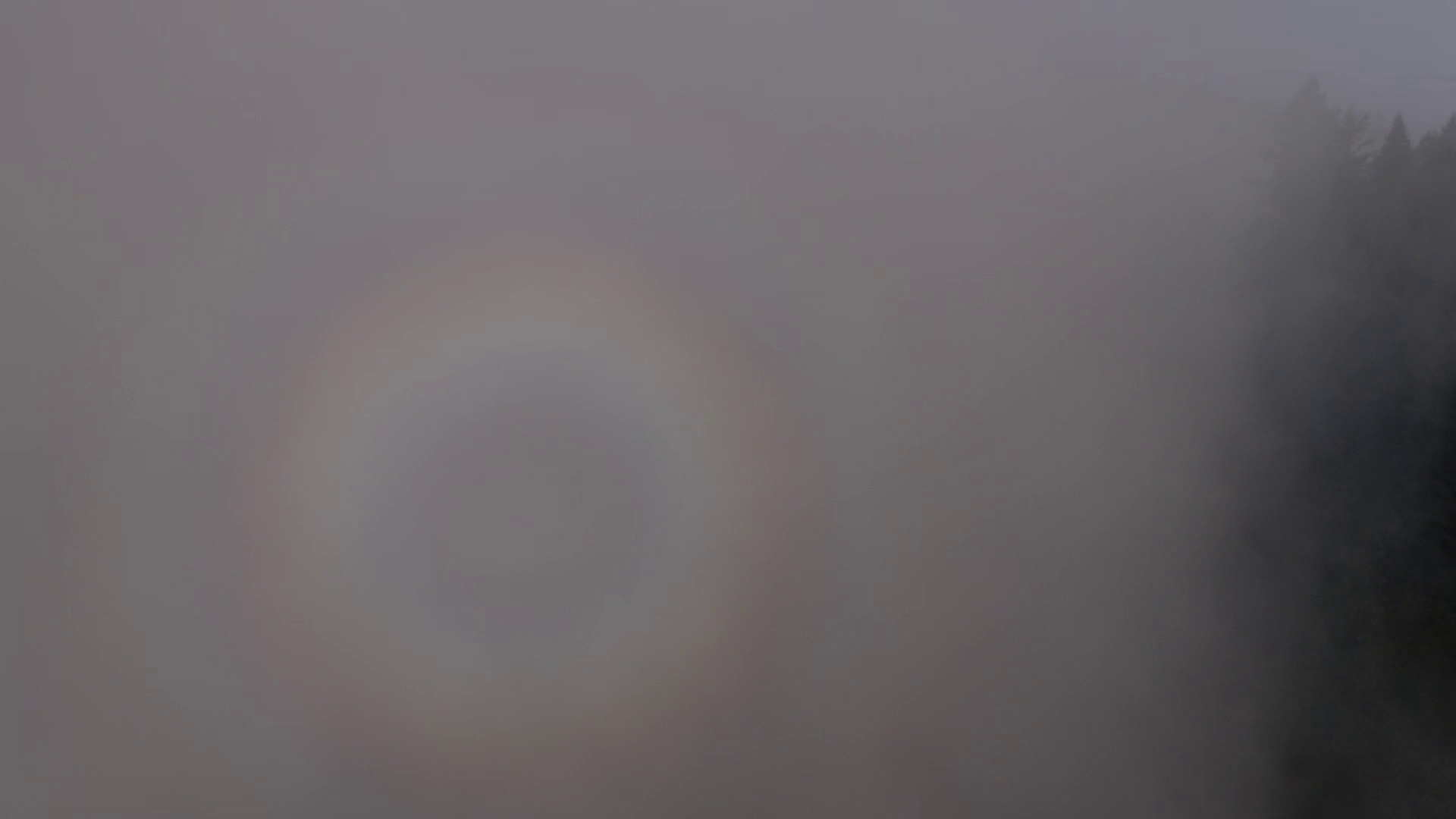
This first shot of the foggy air is different in episode 1 from all the rest; we've got this glowing orb (which we know is Laura, somehow, later) but in the rest of the episodes, we fly INTO Laura's translucent photo!
Here's the same shot in episode 2:
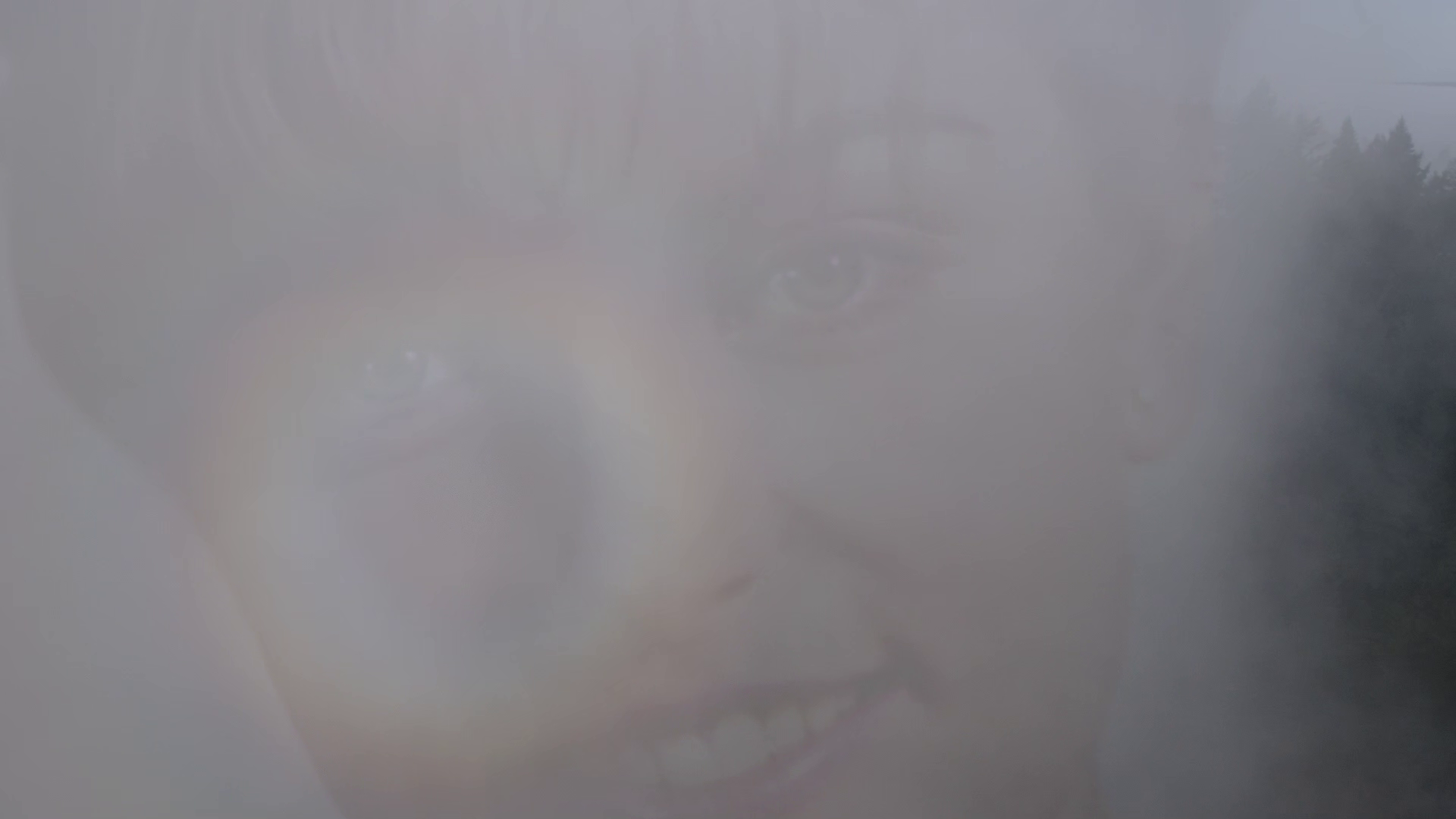
Okay now here's something that I was SO DELIGHTED to see Lou Ming point out, because I had thought of it and was also ready to dismiss it. But he says:
The opening credits begin when Laura’s image has faded away. The fact that the camera will literally pull our POV into the head of Laura Palmer at the beginning of every episode from now on is so direct a visual metaphor I’m almost embarrassed to mention it, but I don’t think I’ve ever seen it mentioned elsewhere.
YEP. But it's the kind of thing that like... we tend to process as abstraction? Or as... as a special effect. As just a thing that sometimes happens in televisual media. Sometimes there's an overlaid image! Often to remind us of something. And it would make sense to be reminded of Laura Palmer at the start of these episodes, because David asserts repeatedly (and so does the show) that Laura is the the pivot point of everything we see.
But David Lynch doesn't use editing or special effects in the usual way. I mean this! I've studied it and you're gonna have to trust me, but part of what makes his movies "feel so weird" is that the camera doesn't move in ways we expect. Techniques are used, but the timing is off, or the placement is strange. And I think David has a very literal image brain, combined with a tendency to also see very strange things. So there are lots of examples in his films (and we're calling TP3 a film) of camera movement being actual abstract movement, not just for "cinematic effect" or drama, but as like... a game mechanic.
AND his special effects are really weird! I saw some people talk really negatively about some of the effects later on in The Return, because they "look cheap." I don't think so! They look strange, but that's different. Things like Laura taking her face off and showing something weird moving around inside — it looks "fake" because, YEAH THAT'S NOT A NORMAL THING THAT CAN HAPPEN. And I think the unusual look is deliberate (or at least I choose to view it that way, who knows what DL is thinking and I already told you it's not important to me) because it helps reinforce the strangeness.
(Realism in televisual media is overvalued. Animation and effects should communicate feeling and meaning, not strive to trick us into seeing the unreal as real. This is why the animated Disney movies, which were mostly created playfully by expressive (many queer) artists about feelings, are flawed but utterly untouchable by the "live action" aka entirely-computer-generated remakes, which are about.......... distorting our sense of reality? Subduing us with Spectacle?? Perpetually recolonizing the imagination??? ANYWAY NEEDLESS TANGENT but I told you I'm just typing stuff)
There are several prominent depictions of things overlaid on top of each other that I think convey meaning, not just transition. Cooper's face speaking over the "climactic battle" scene towards the end. Trees overlaid on dark roads (I'll get there). Even later in the opening, we go off the side of the waterfall, water overlaid with waving curtains, overlaid with zigzag floor, fading to black, and then we're off...
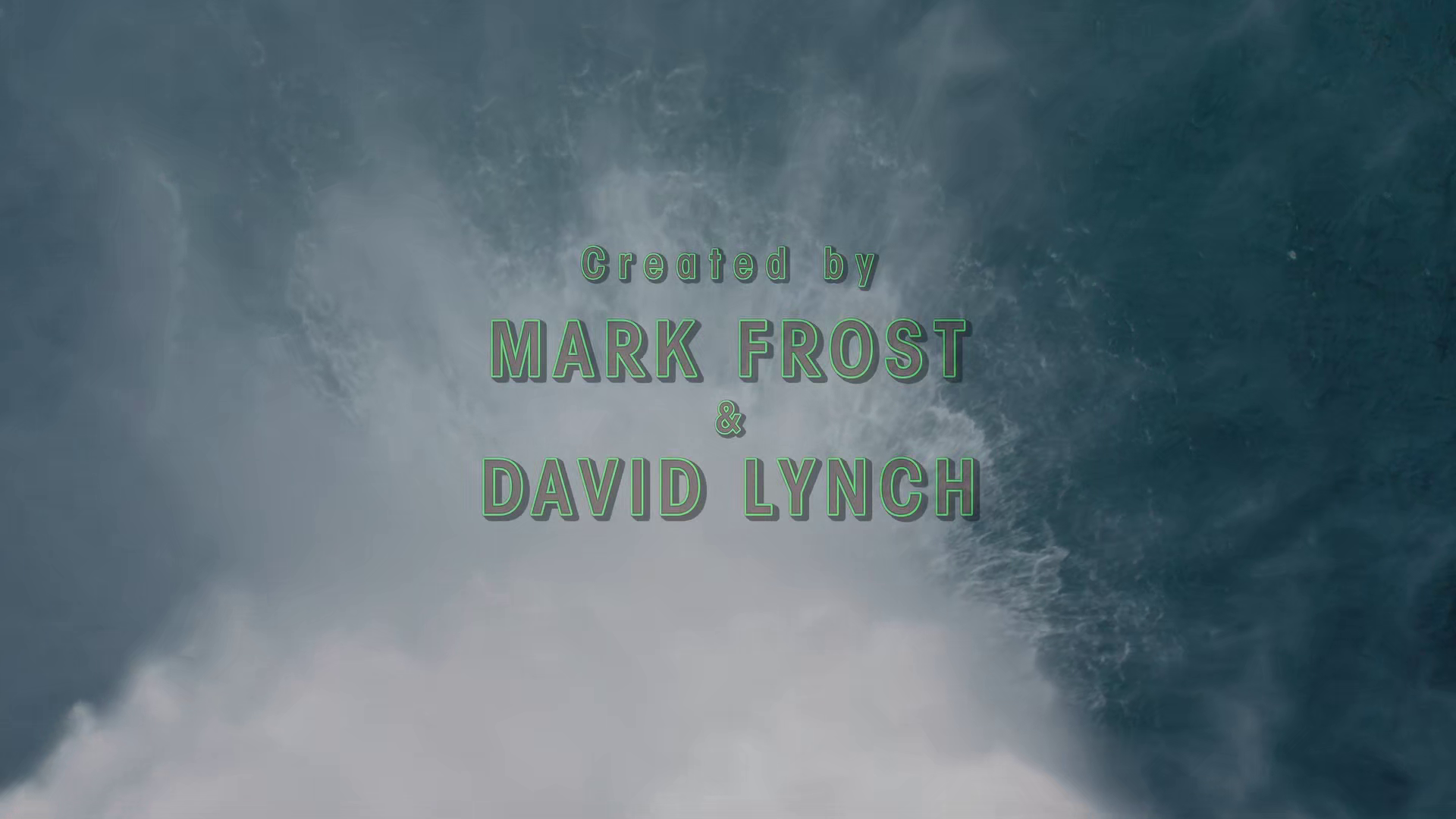
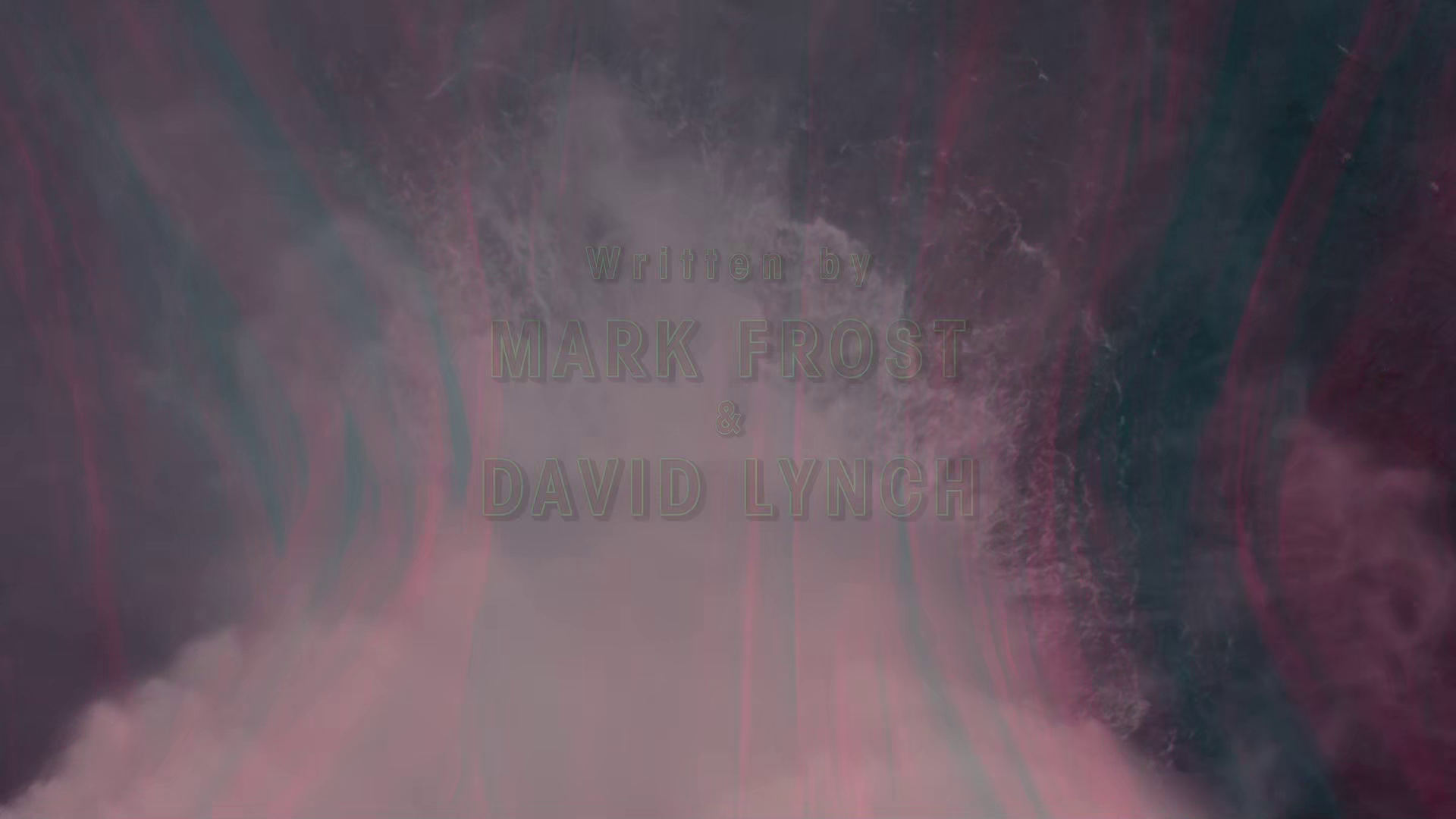
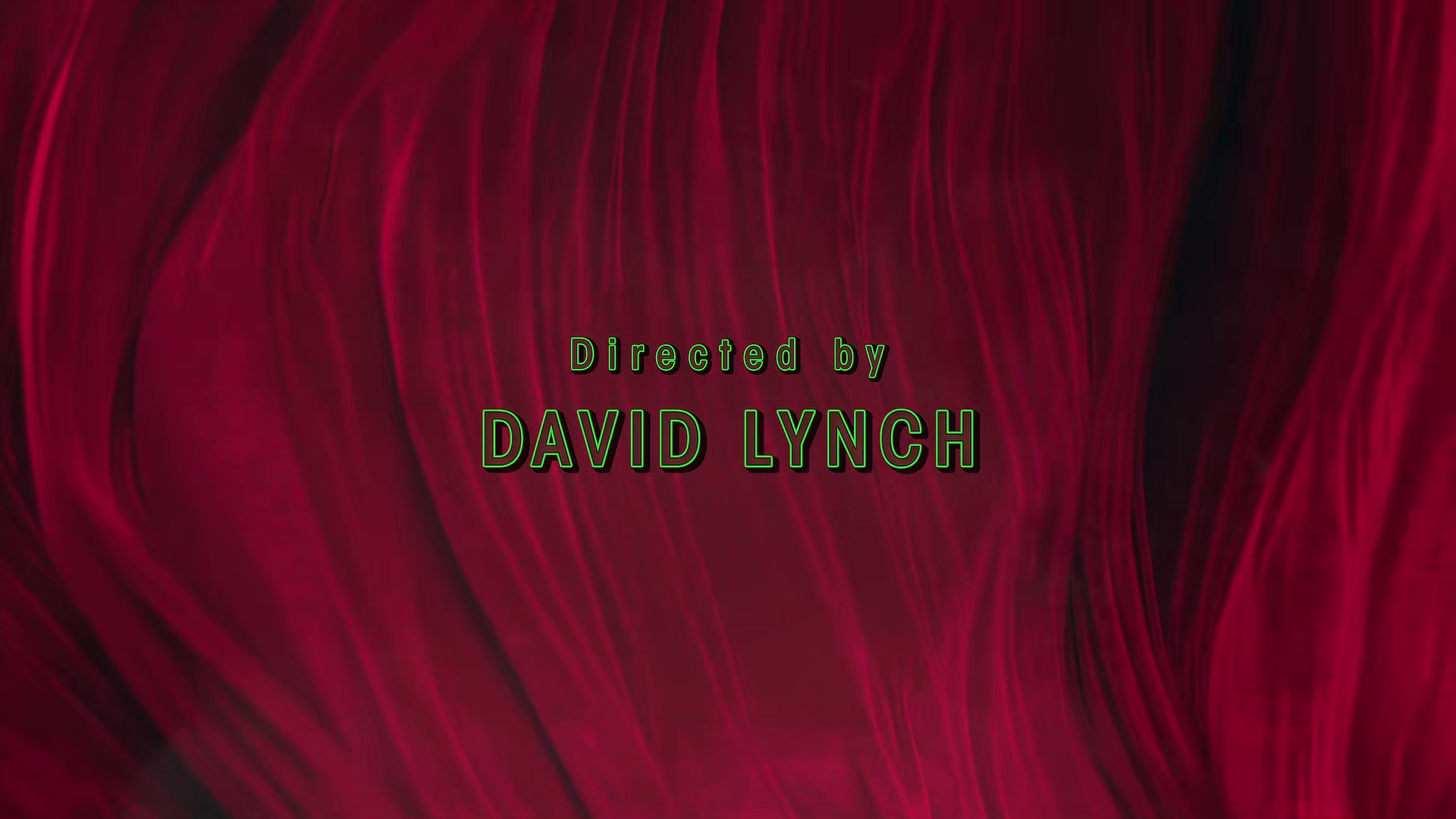


So, let's take it literally. Things shown visually blended are the same thing, or are very closely related. That's cool! Maybe a kind of wave-particle thing. And in this shot? We see a bunch of things overlaid: Laura Palmer's high school photo. Fog, literally the air around us. Trees, the forest that means so much in Twin Peaks, which I read as the subconscious darkness from which everything emerged. The sawmill, transforming raw lumber into usable material. Ghostwood Forest, colonized and cauterized by white humans, still a precious enough resource that Audrey chains herself catastrophically to the bank vault to prevent its further commodification, finally cut down to build a massive prison. This is all hugely important! And it's not even all subtext!!!!!
Here, we're being shown, all of this is Laura.
And as an image of Coop staring at the camera is overlaid halfway through Part 17, we hear his slowed & deepened voice say, "We live inside a dream."
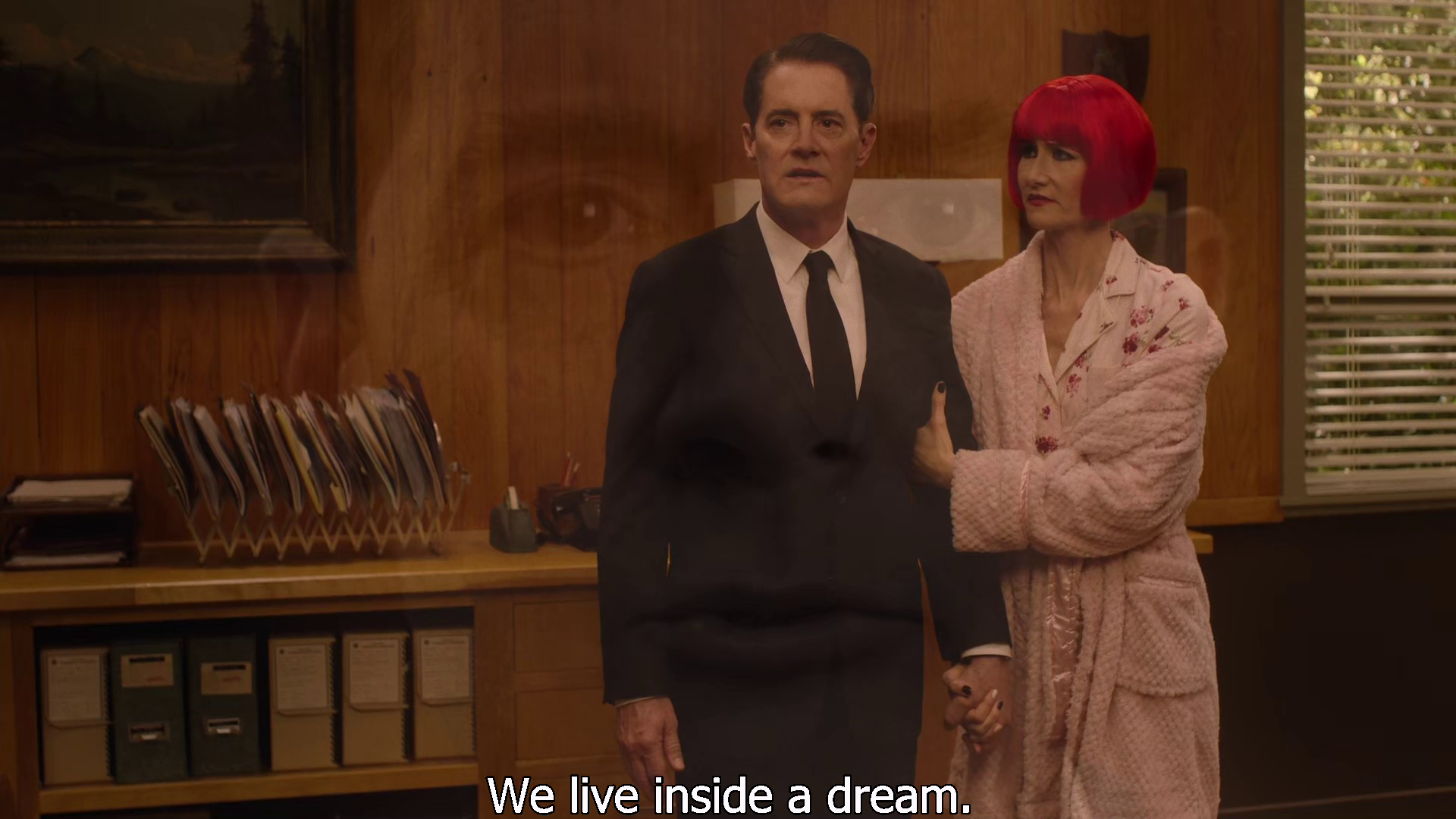
OR MAYBE NOT, who can never be sure?
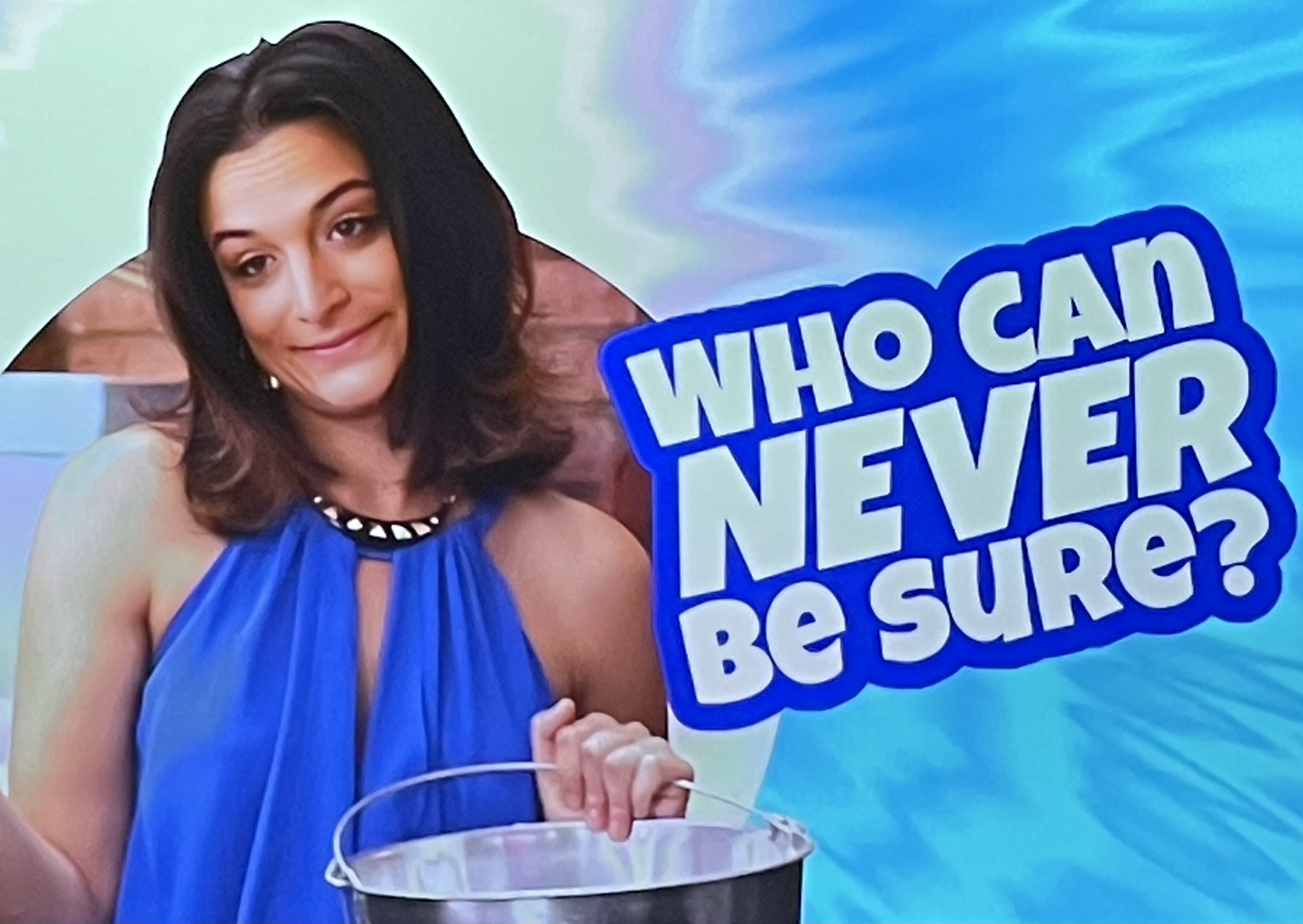
WE ARE A DEAD GIRL
If you know Twin Peaks well, some of this is going to sound obvious. Maybe it is! Let's take a closer look anyway.
One thing to remember is: Laura's dead. We're looking at dead girl, sitting and talking with an alive guy, in some space that isn't "the real world." Laura's strange speech is filmed in a really cool way: they filmed everybody talking and moving in reverse. And they didn't have computer editing in 1991, so they actually came up with a way to load film into a camera so that it was physically filmed backwards!! That rules.
But why is it like this? Again, maybe David just "wants things to feel weird." And it sure does work! To me it feels like there's a translation layer; these reverse-reversed shots, which also use strange wording, are like the dreaming brain communicating with the waking. Dale's not reversed; he's the only person who ever speaks "normally" in this red-curtained room (what they call The Red Room, or as Bad Cooper says later, "what they call the Black Lodge," meaning that's not what these places are actually called. And names matter). Why? He's our perspective? He's the Agent of decrypting these messages. He finds this place, gets trapped there, is duplicated and ethically-mirrored, and stays here for 25 years. As we're about to see.
After we enter the fog, crossfade to A Smokestack. Part of the Mill, I think!
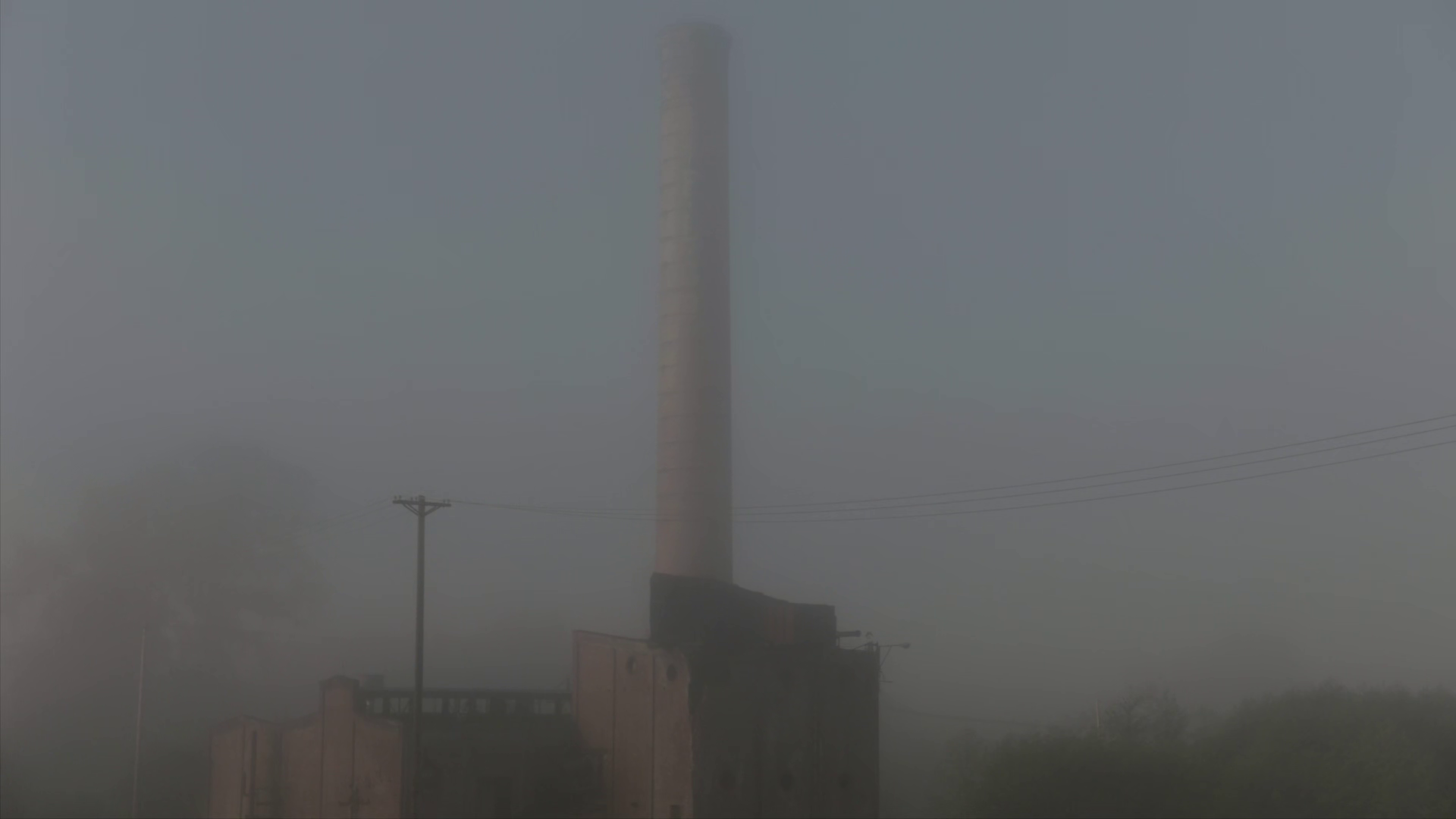
It correlates with this shot from the Original Series opening:
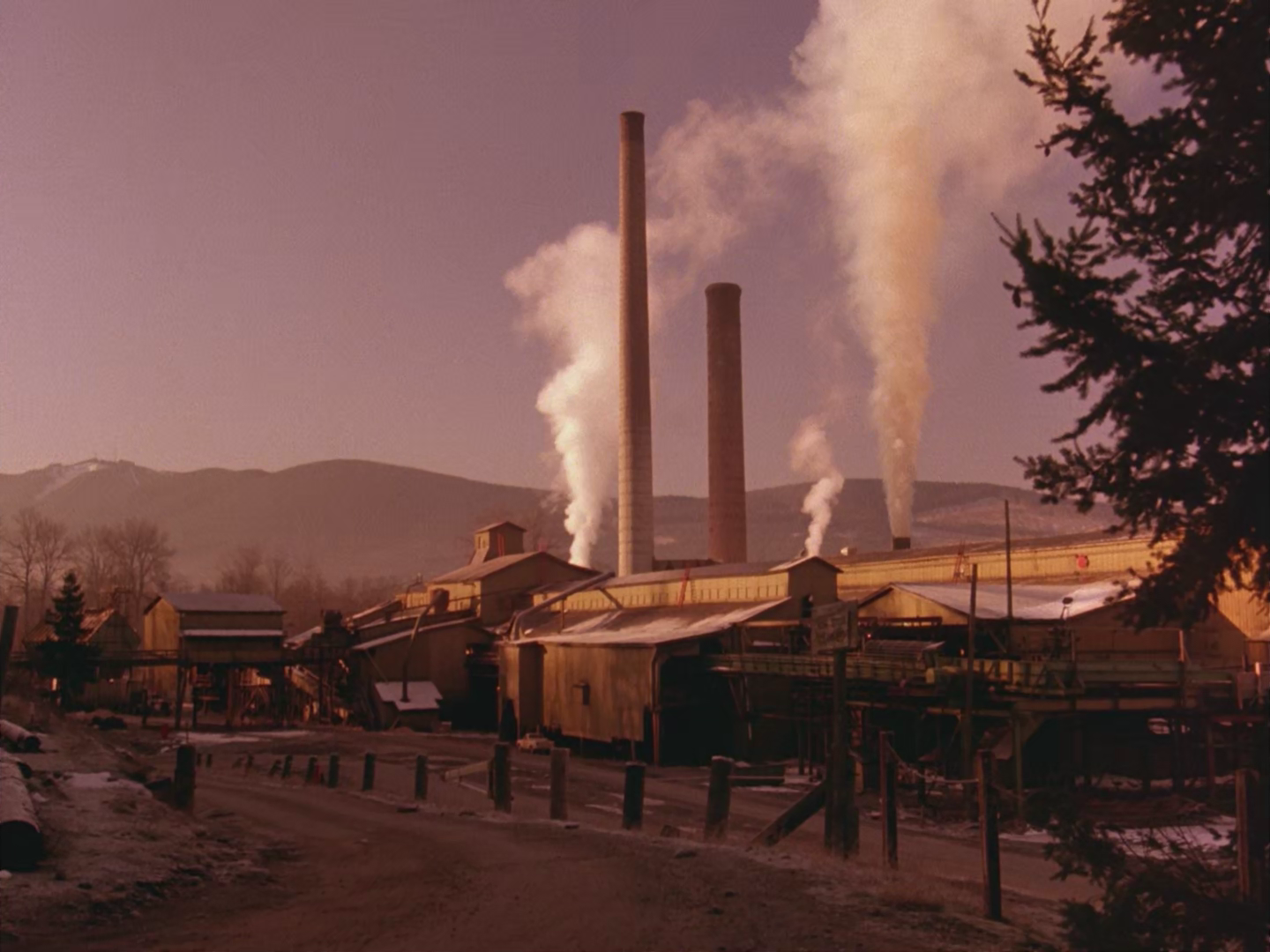
Except now the smokestacks are dead, everything is still and surrounded by fog. Then where the original series really dwells on the interior of the factory, the sharpening of blades and casting off of fire, the Dead Mill crossfades to the High School. Both quintessentially American factories, attempting to turn out uniform products compatible with the needs of business.
Season 1:
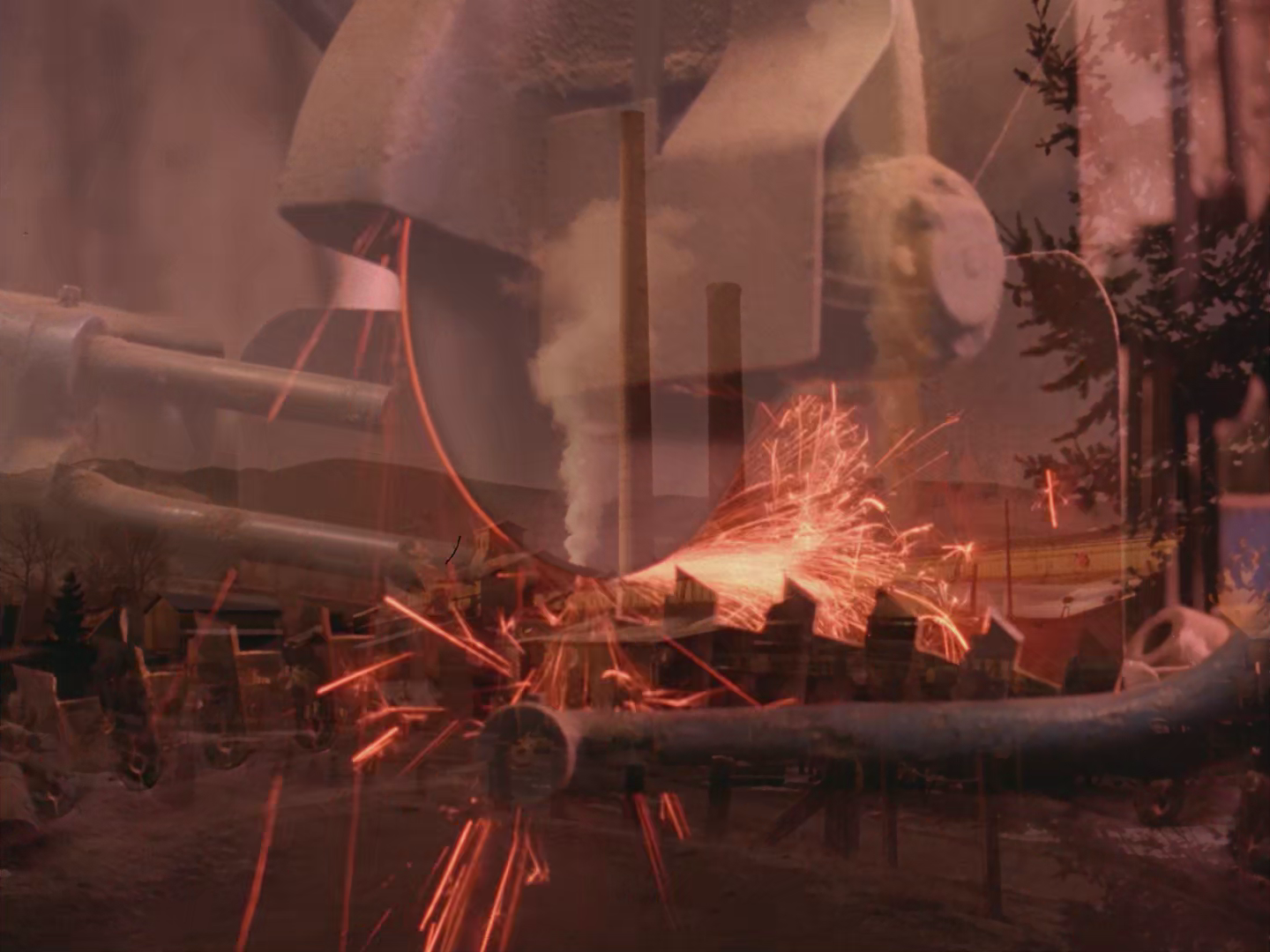
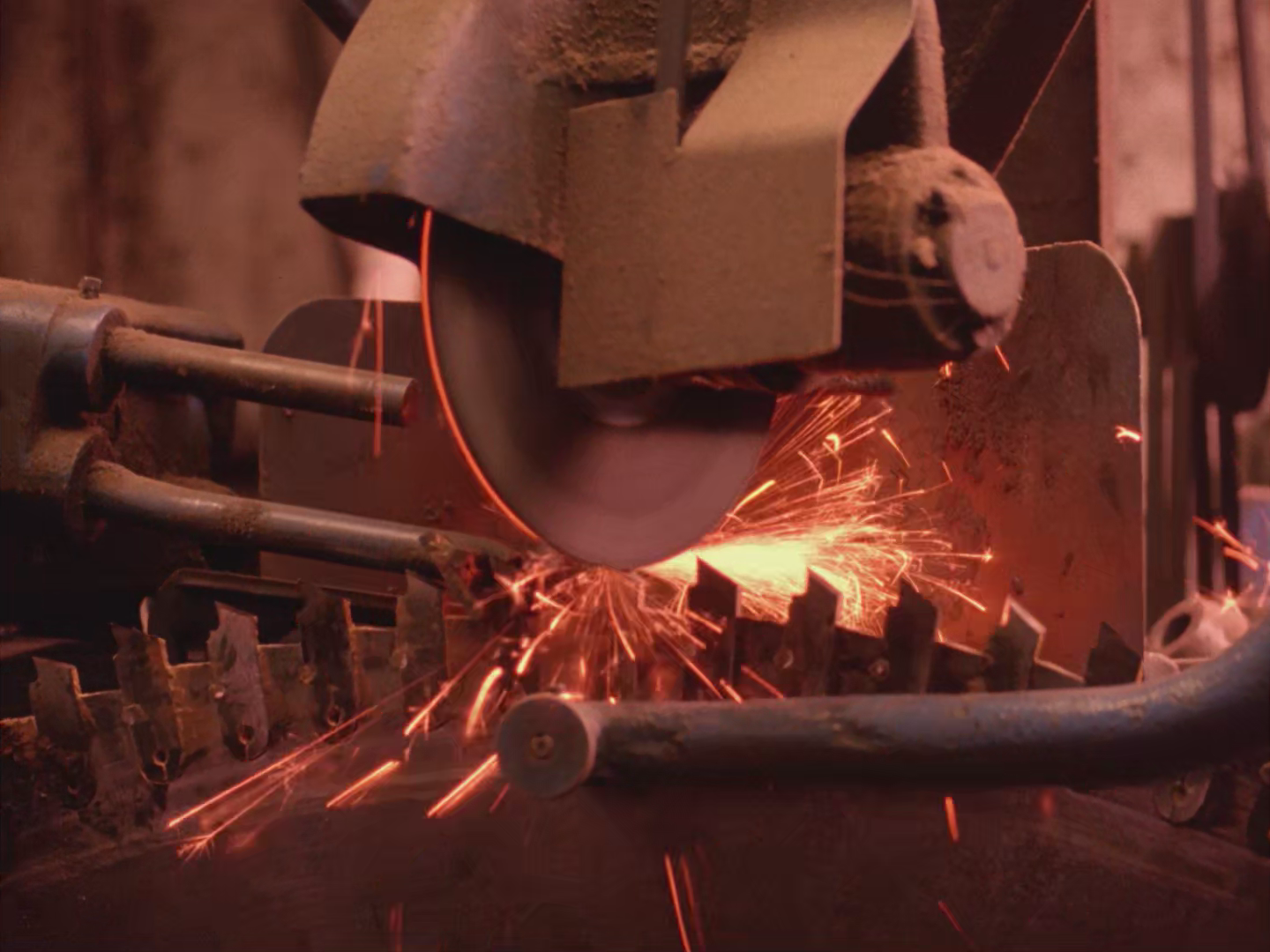
Season 3:
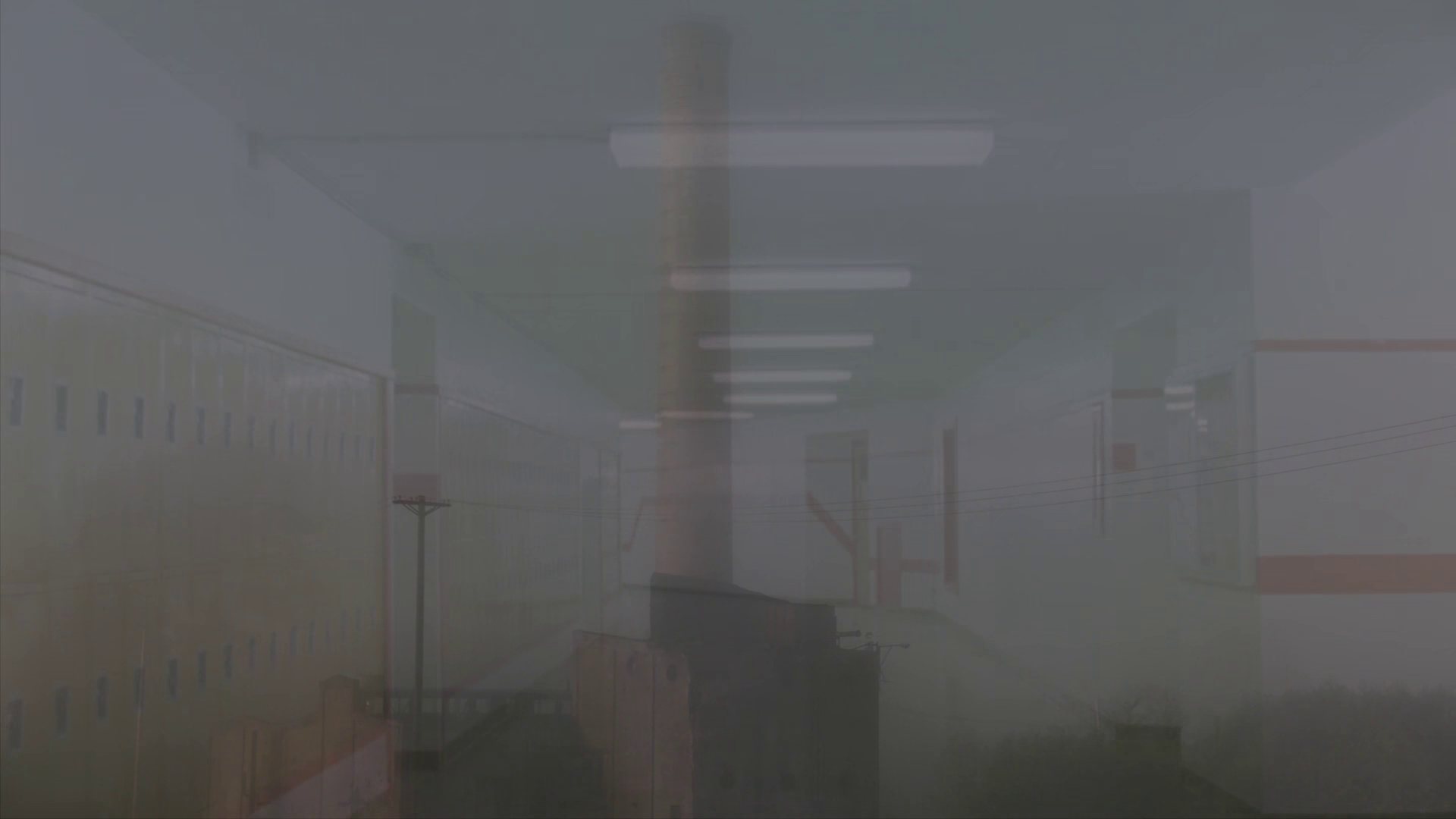
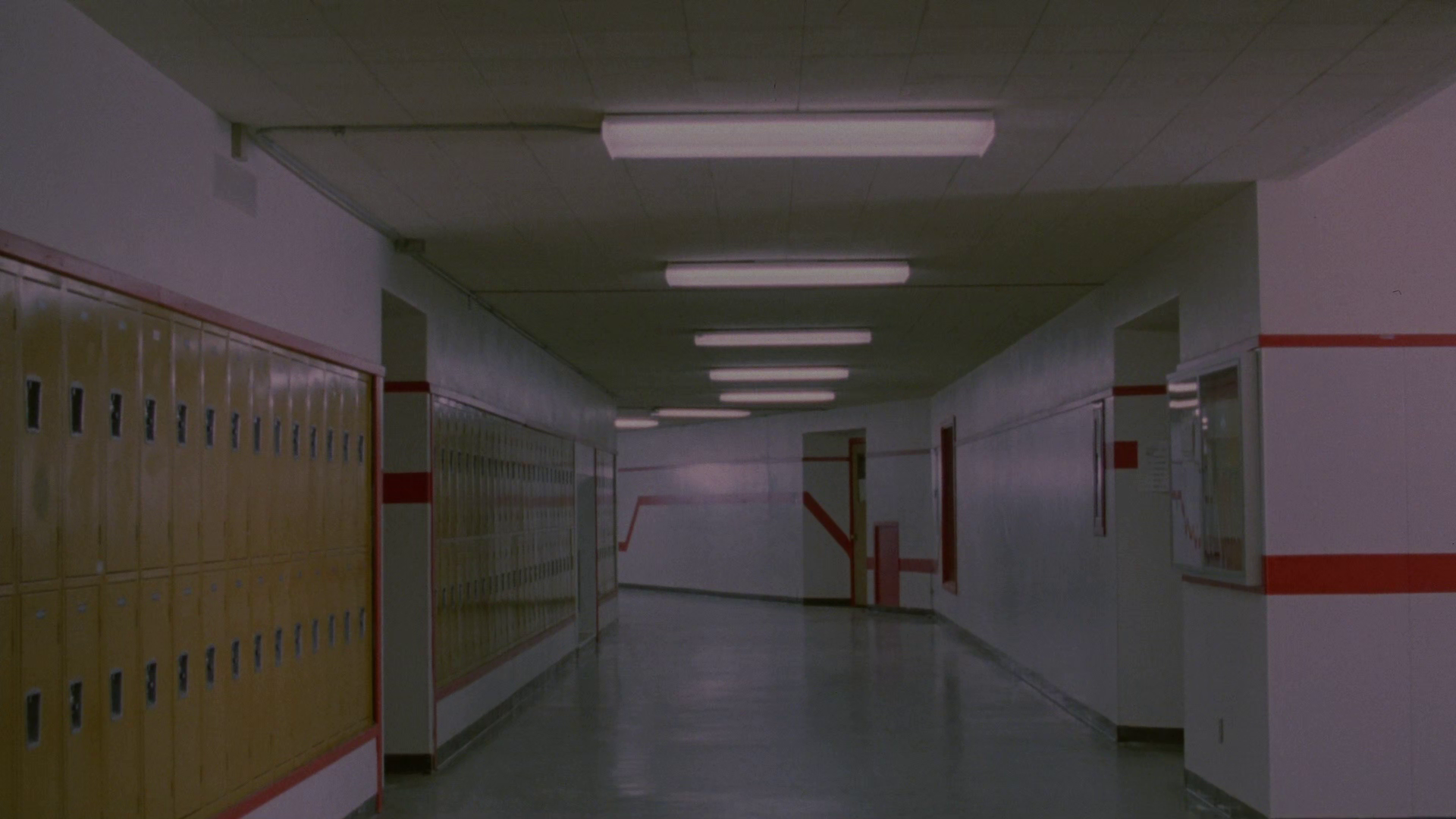
If crossfading indicates connection, then I'm not just being hyperbolic! I think this is kind of the core of Twin Peaks, and especially Season 3: the violence committed by the United States against everyone, including its own people. Particularly by impoverishing us, financially and morally, and keeping us from being Our True Selves so that we'll continue the cycle.
It's been 25 years. How much have things changed from the tragicomic soap opera suffering of Season 1 up to now?
OKAY focusing again on S3 E1, we see the girl running and crying (with blue socks and collar) in slow motion, and then the trophy case featuring Laura Palmer's senior photo.
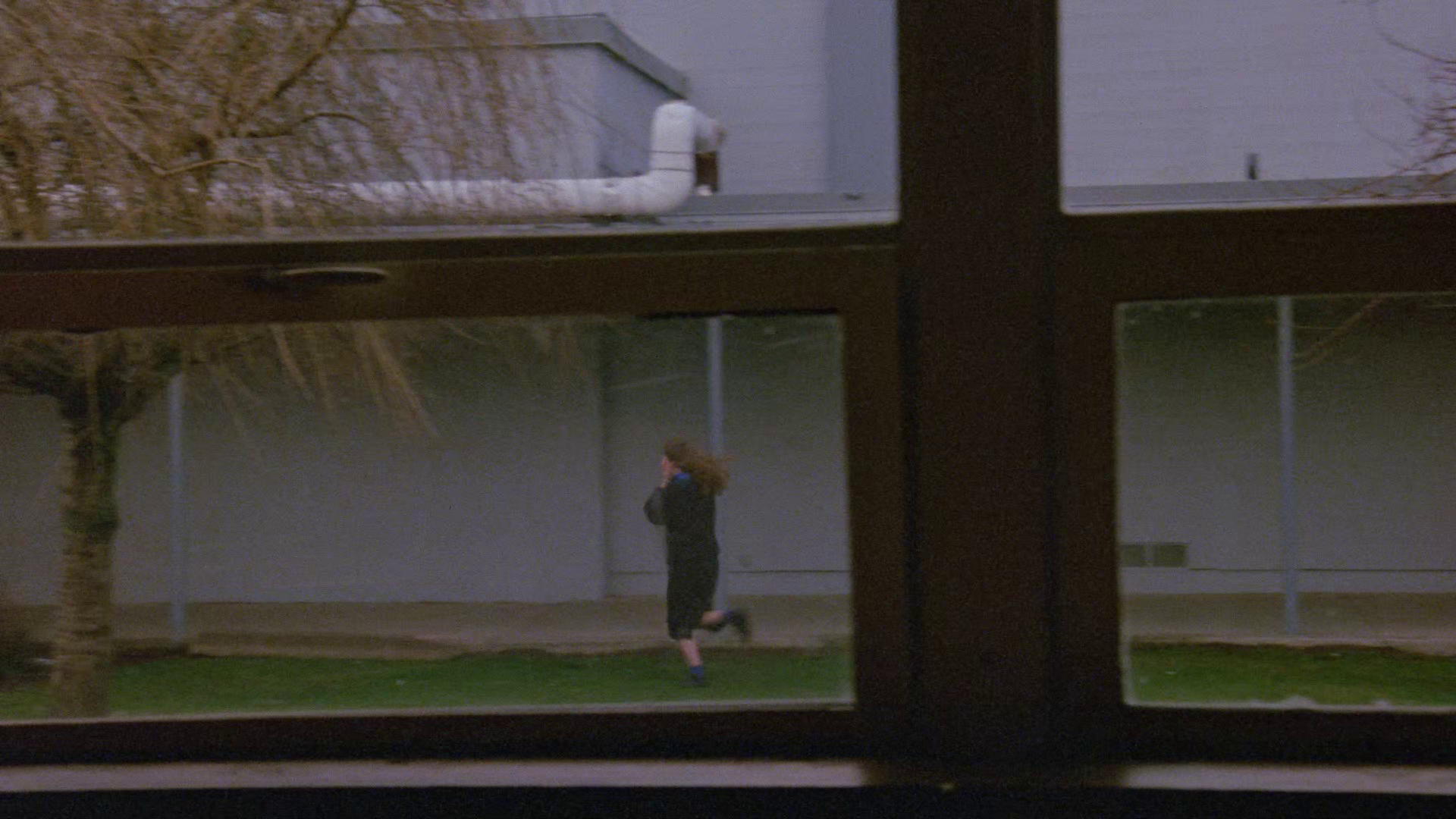
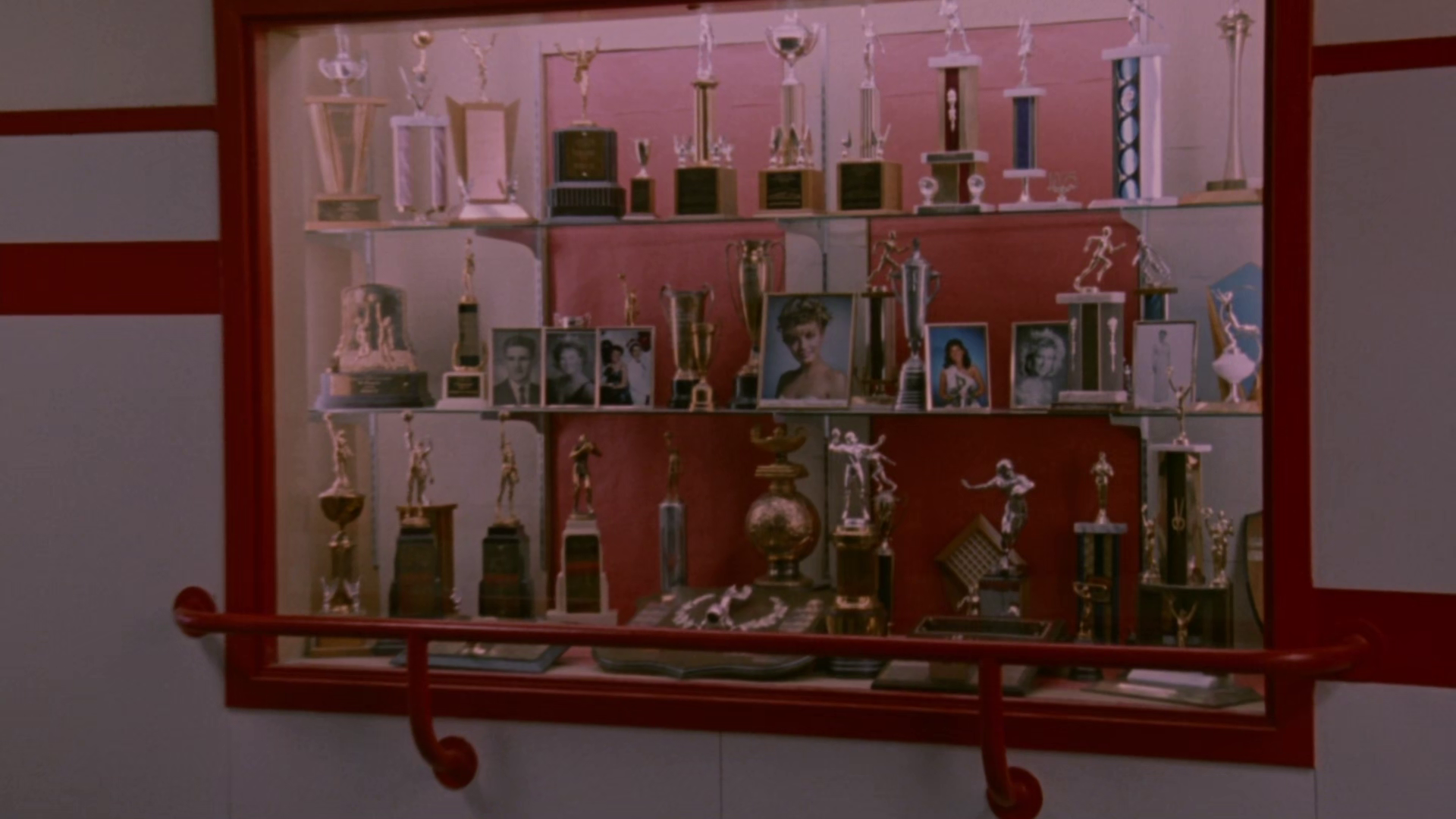
THIS LITERALLY JUST OCCURRED TO ME, but Laura is on display here as a trophy. Like a buck's head mounted to the wall (like Buckhorn, South Dakota), she is dead and preserved. An ideal. An idea.
This is one of many many things that has an obvious surface reading; it's normal to put photos of students in the trophy case, right? There are others alongside.
But IF we're inside Laura's dream, the dream of being Laura, then this huge picture in the dead center of the trophy case is pretty ominous.
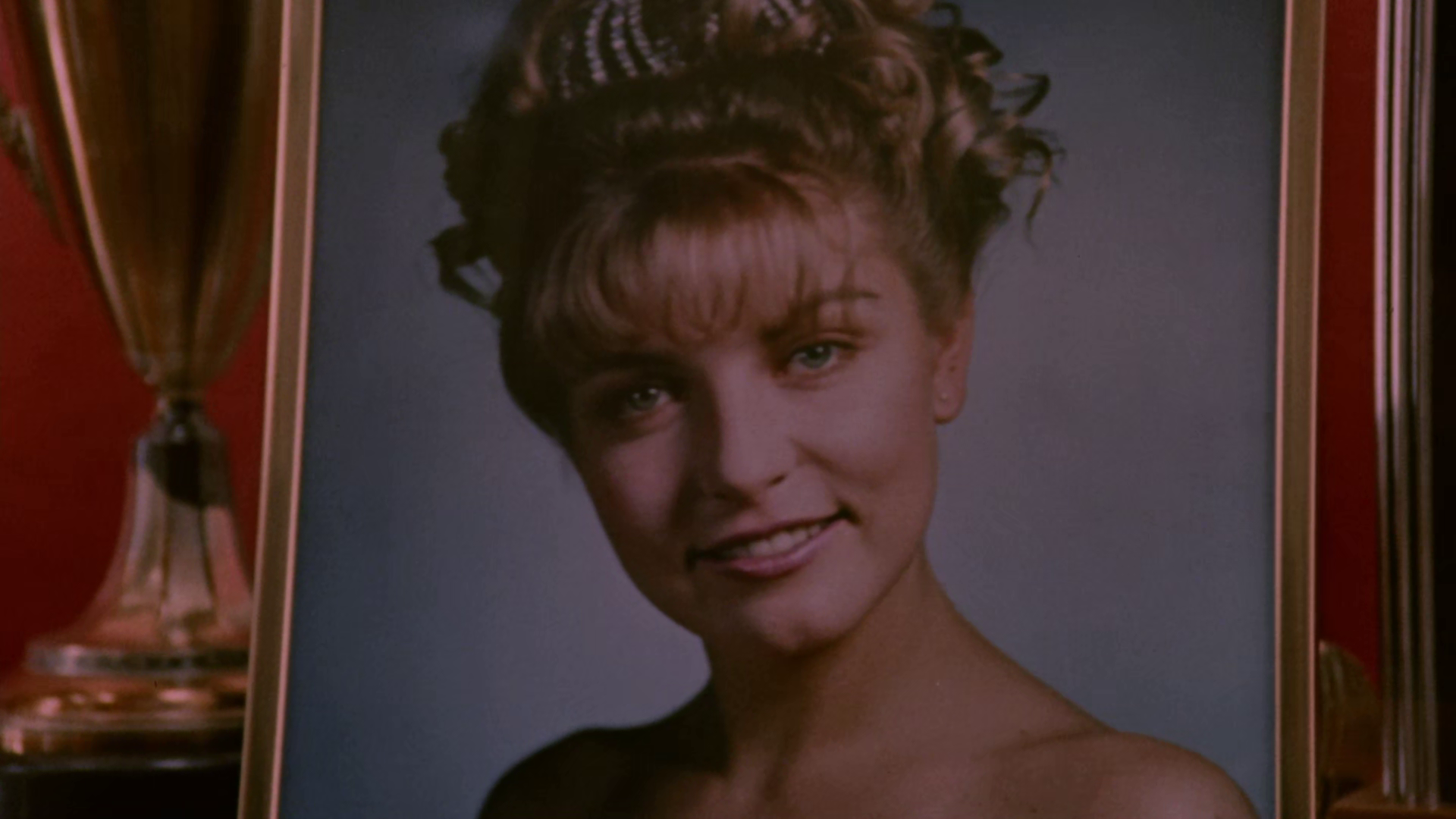
And again, we move slowly in on the photo, and then the title is overlaid across her eyes, the Jane Doe lightly obscured.
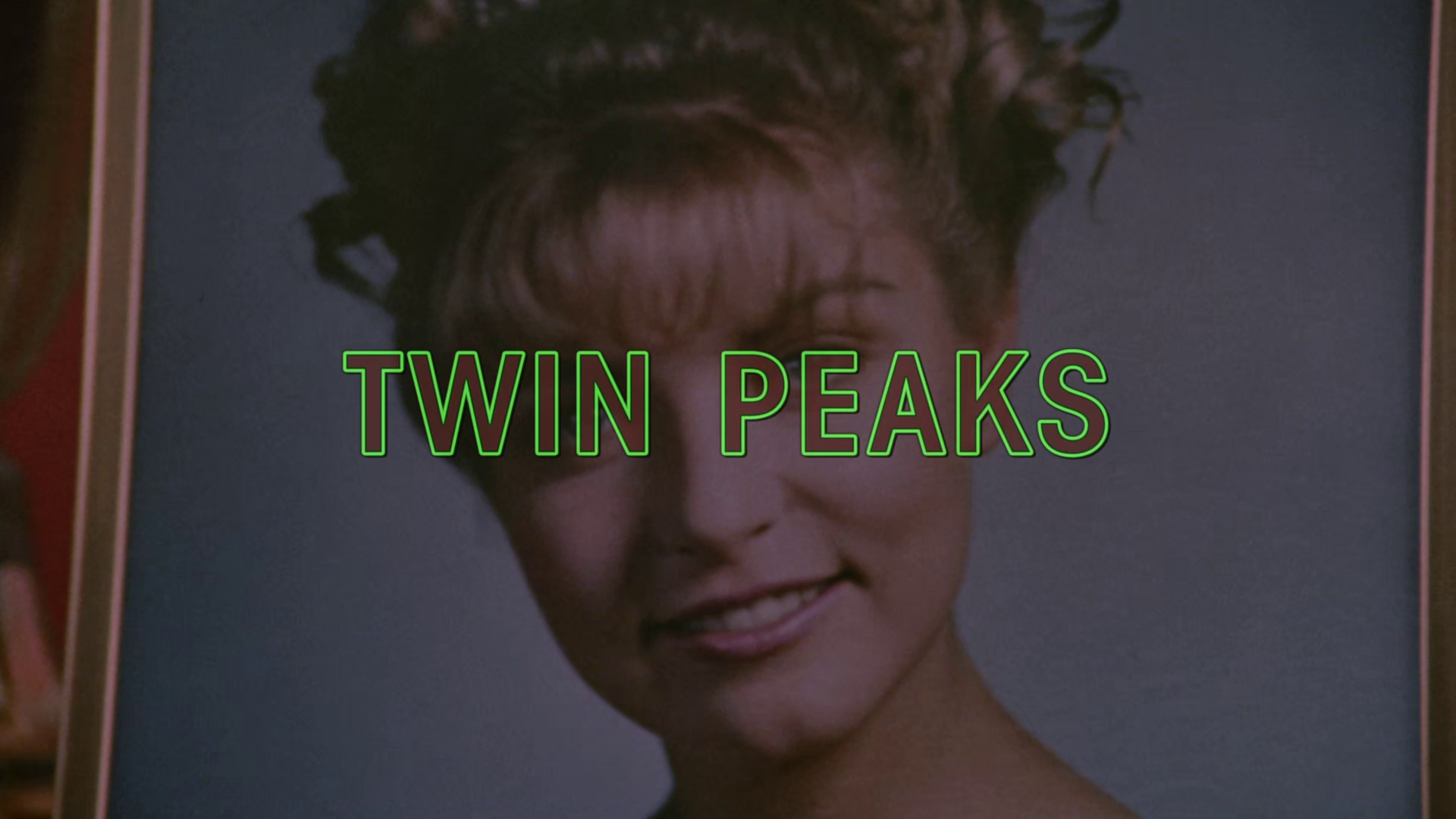
What's the correlating shot in the original credits?
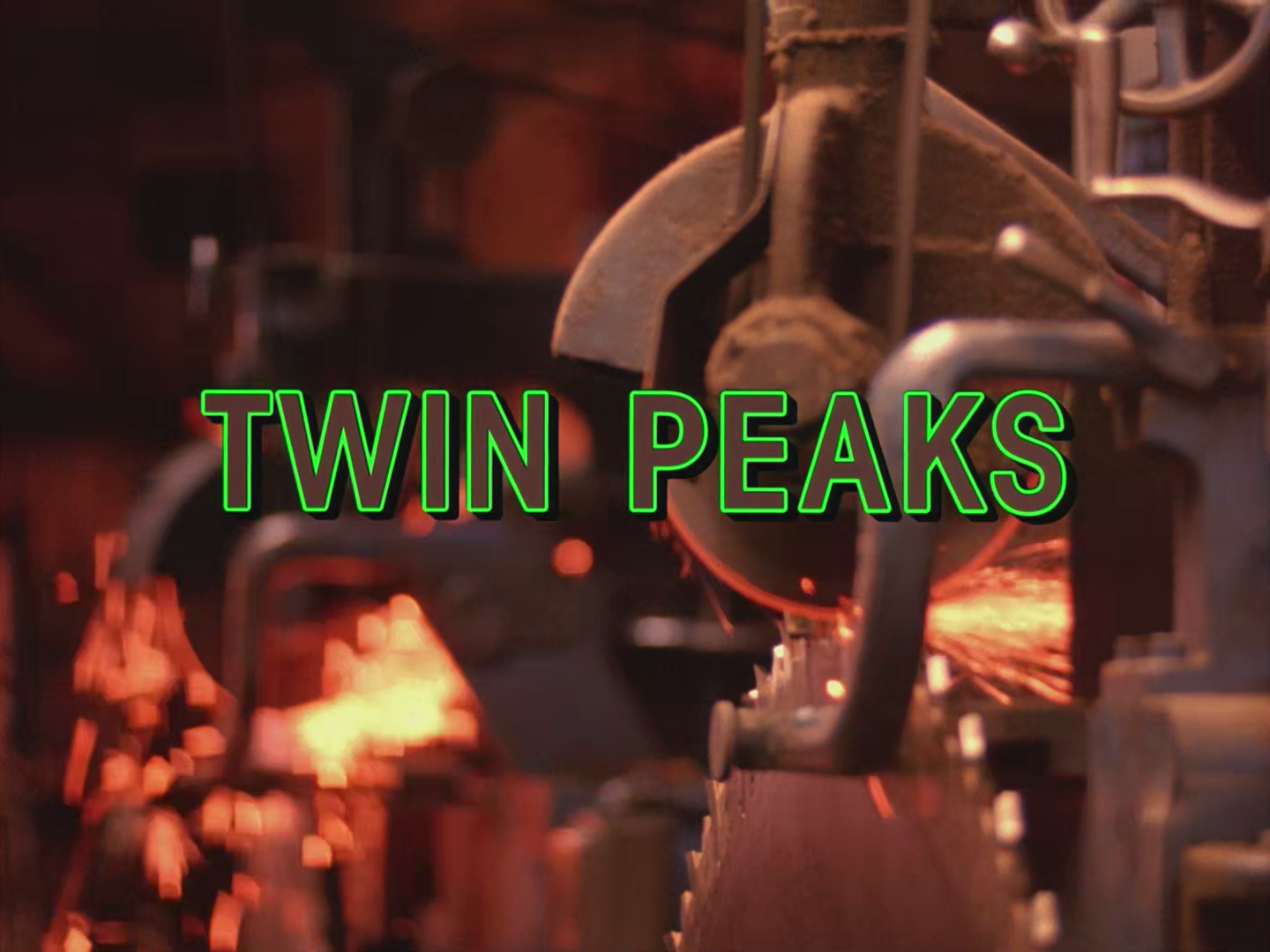
Oh, just the industrialized sharpening of blades. Machines designed to turn beautiful, natural life into construction materials.
If Laura is the raw material — what's the product?
△△
Continued in Part 01a.